- Home
- China
- World
- Europe
- Politics
- Business
- Opinions
- Tech & Sci
- Culture
- Sports
- Travel
- Nature
- Picture
- Video
- Live
- TV
- Specials
By continuing to browse our site you agree to our use of cookies, revised Privacy Policy and Terms of Use. You can change your cookie settings through your browser.
SUMMARY
The Lebanese cabinet announced on Wednesday a two-week-long state of emergency in Beirut. The death toll from the deadly blast at the capital's port area Tuesday evening has climbed to 158, with around 6,000 people wounded and 21 are still reported missing.
Here is what we know so far:
The blast rocked the Port of Beirut at around 6 p.m. local time (1610 GMT) Tuesday, shaking buildings all over the city and causing massive casualties and damages.
The cause of the blast is being investigated. But Lebanon's prime minister, Hassan Diab, said the cause of the massive explosion was 2,750 tonnes of ammonium nitrate stored in a warehouse for six years. President Michel Aoun tweeted it was "unacceptable" the explosives had been stored unsafely.
Local media and a security source said welding work being carried out on a hole in the warehouse at the port started the massive blast, Reuters reported.
World leaders have offered support and condolences to the country, including Gulf nations in the region. Israel has also offered humanitarian aid.
A donors' video conference organised by France and the UN will be held on Sunday at 1200 GMT with several world leaders in attendance.
Syria said 43 nationals were killed in the deadly blast and the Netherlands confirmed that the wife of Dutch ambassador to Lebanon Jan Waltmans has died of wounds sustained in the explosion.
A Chinese national sustained a slight injury amid the blast, the Chinese embassy said.
Beirut port explosion death toll rises to 158: Lebanon health ministry
The death toll from Tuesday's catastrophic explosion at the port of Beirut has risen to 158, the Lebanese health ministry media office said on Saturday.
The number of people injured exceeds 6,000 and 21 are still reported missing, it said.
Beirut blast: Syria says 43 nationals killed; The Netherlands confirms wife of its ambassador to Lebanon died of injuries
Forty-three Syrians were among those killed in the massive blast that devastated the Lebanese capital this week, the Syrian embassy said Saturday.
"The confirmed number we have of Syrian martyrs so far is 43," it said. "The embassy is offering all services to facilitate the transfer of some of the corpses back to Syria and is helping bury others in Lebanon," it added.
On Saturday, the Netherlands' foreign ministry also confirmed the wife of Dutch ambassador to Lebanon Jan Waltmans has died of wounds sustained in the Beirut bomb explosion.
"It is with dismay and great sadness that we report the death of our colleague Hedwig Waltmans-Molier. She succumbed to injuries sustained in the massive explosion in Beirut," the ministry said in a statement.
It's not clear if the above fatalities were among the official death toll of 154 announced earlier by the Lebanese authorities.
According to the Lebanese health ministry, more than 60 people are still unaccounted for after the port blast on Tuesday.
UN Beirut donors' video conference 1200 GMT Sunday: France
A donors' video conference organized by France and the United Nations to stump up aid for the devastated Lebanese capital Beirut will be held Sunday at 1200 GMT, the French president's office announced Saturday.
U.S. President Donald Trump had announced Friday that he would take part, saying, "everyone wants to help!"
The blast Tuesday at Beirut's port killed more than 150 people and devastated swathes of the city.
Officials say a huge shipment of dangerous ammonium nitrate, a base chemical for fertilizers and explosives, had been stored unproperly for years in a warehouse at the port and somehow caught fire, leading to the massive, deadly blast.
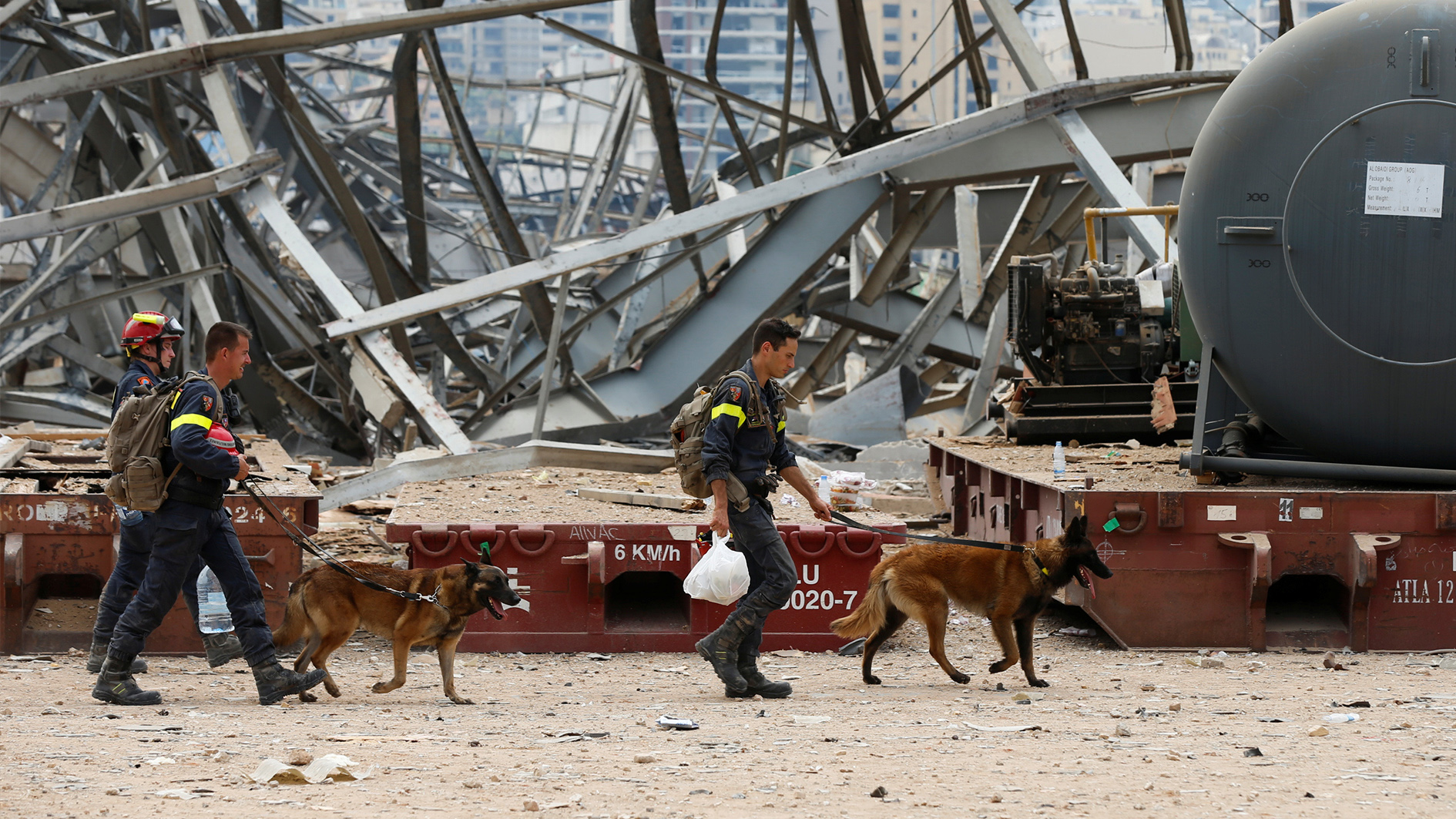
The search in the Lebanese capital of Beirut continues for the dozens of people still missing, most of whom were at the Port of Beirut where the blast occurred. CGTN's Adel El Mahrouky spoke with some of their family members.
More than 60 still missing after Beirut mega-blast: ministry
More than 60 people are still missing in Beirut, four days after a massive explosion at the city's port left more than 150 people dead, a health ministry official said Saturday.
"The number of dead (death) is 154, including 25 who have not yet been identified," the official told AFP. "In addition, we have more than 60 people still missing."
The health minister said on Friday that at least 120 of the 5,000 people who were injured on Tuesday are in critical condition.
Beirut blast a wake-up call on dangers of ammonium nitrate: experts
The devastating explosion in Beirut should be a wake-up call for countries on the dangers of ammonium nitrate, which caused the blast, experts say.
Lebanese authorities said 2,750 tonnes of the industrial chemical had been stored for six years at Beirut port without safety measures. That stockpile exploded on Tuesday, killing more than 150 people, injuring thousands and leaving about a quarter of a million people homeless.
Commonly used in fertilizers and as an industrial explosive, ammonium nitrate is considered relatively safe if handled properly, but it has proved lethal.
In one of the world's deadliest industrial accidents, 567 people were killed in Texas in 1947 when 2,300 tonnes of ammonium nitrate detonated aboard a ship.
Read more here.
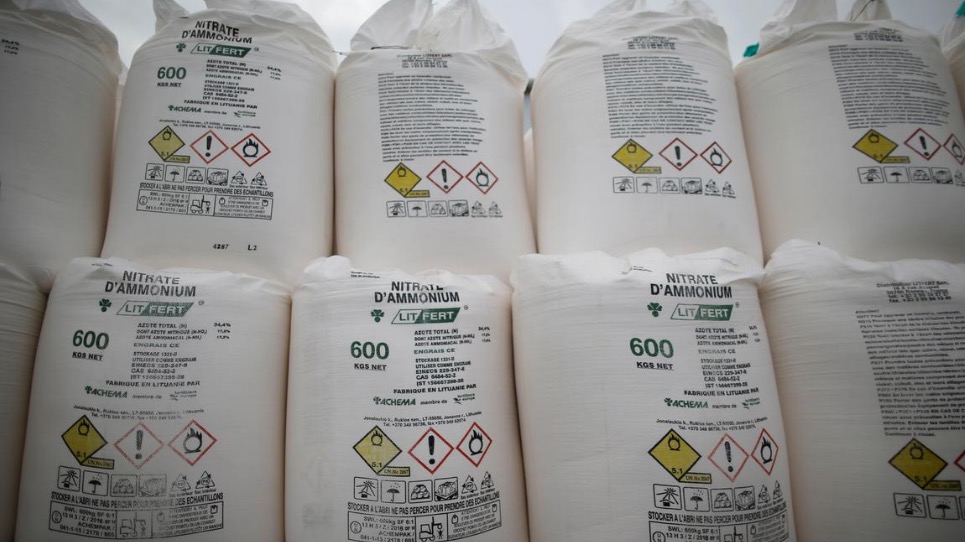
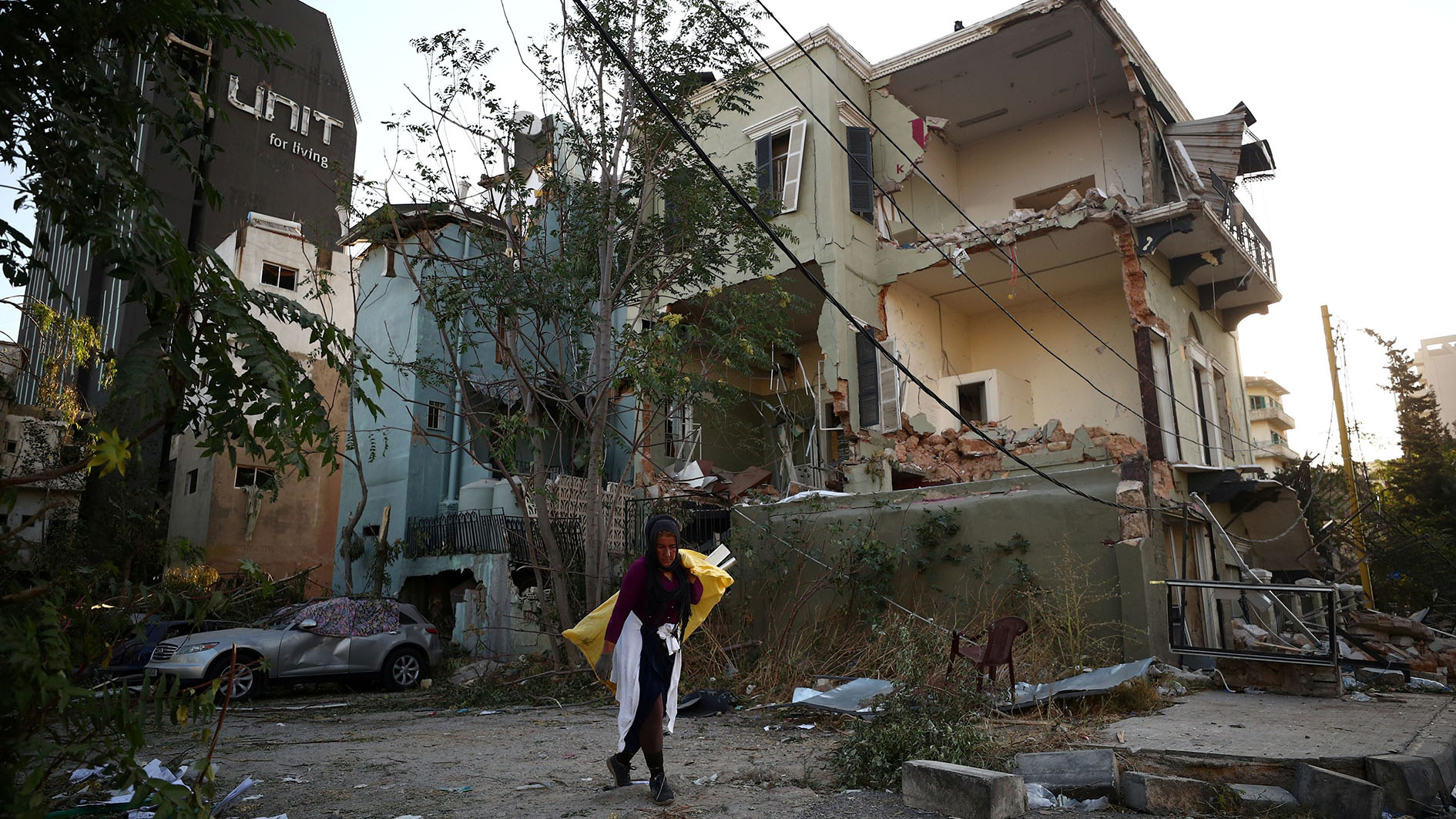
Tuesday's explosion at Beirut port left more than 250,000 people homeless. Dozens of port employees have been arrested, as calls grow for transparent investigation. Local media says communication lines and transport have been severely damaged, hindering rescue operations.
Lebanon president says Beirut explosion cause unknown, possibility of external interference
Lebanon's president said an investigation into the Beirut port warehouse explosion was looking at whether it was caused by negligence, an accident or possible external interference, local media reported on Friday citing the president's office.
"The cause has not been determined yet. There is a possibility of external interference through a rocket or bomb or other act," President Michel Aoun said.
A small but violent protest broke out near an entrance to parliament in central Beirut on Thursday following the devastating explosion that rocked the Port of Beirut, killing at least 154 and injuring over 5,000 others.
Death toll from Beirut blast reaches 154
The death toll from the Beirut explosion has risen to 154, local media reported, citing the Lebanese Health Minister Hamad Hasan on Friday.
Minister Hamad Hasan said one in five of the some 5,000 people injured in Tuesday's blast had required hospitalization, and 120 were in critical condition, according to the report.
UN and WFP offer emergency funds and aid delivery after Beirut explosion
The United Nations is aiding the Lebanese government following the deadly explosion in Beirut by releasing emergency funds, assessing needs and planning alternative aid delivery, a UN spokesman said on Thursday.
Already 9 million U.S. dollars in emergency aid has been released locally for hospitals and the UN Office for the Coordination of Humanitarian Affairs (OCHA) is expected to disburse additional funds soon, said Farhan Haq, deputy spokesman for UN Secretary-General Antonio Guterres.
The OCHA is sending emergency teams that include experts from the International Search and Rescue Advisory Group and UN Disaster Assessment and Coordination team to assist with the emergency response.
Meanwhile, the World Food Programme plans to import wheat flour and grains for bakeries and mills to help protect against food shortages across Lebanon after a blast wrecked its main port in Beirut, the UN agency said on Friday.
16 port employees arrested over Beirut explosion
A total of 16 employees at Port of Beirut have been detained over deadly explosions that rocked the port on Tuesday, Government Commissioner to the Military Tribunal Judge Fadi Akiki announced on Thursday evening.
Akiki said that more than 18 people have been questioned so far, including port and customs officials as well as people in charge of maintenance at the hangar where explosive materials had been stored for years, the National News Agency reported.
Meanwhile, Beirut's First Investigative Judge Ghassan Oueidat issued a decision prohibiting the travel of seven port officials.
Two huge explosions rocked the Port of Beirut on Tuesday evening, killing at least 149 people and injuring nearly 5,000 others, causing massive damage in the city.
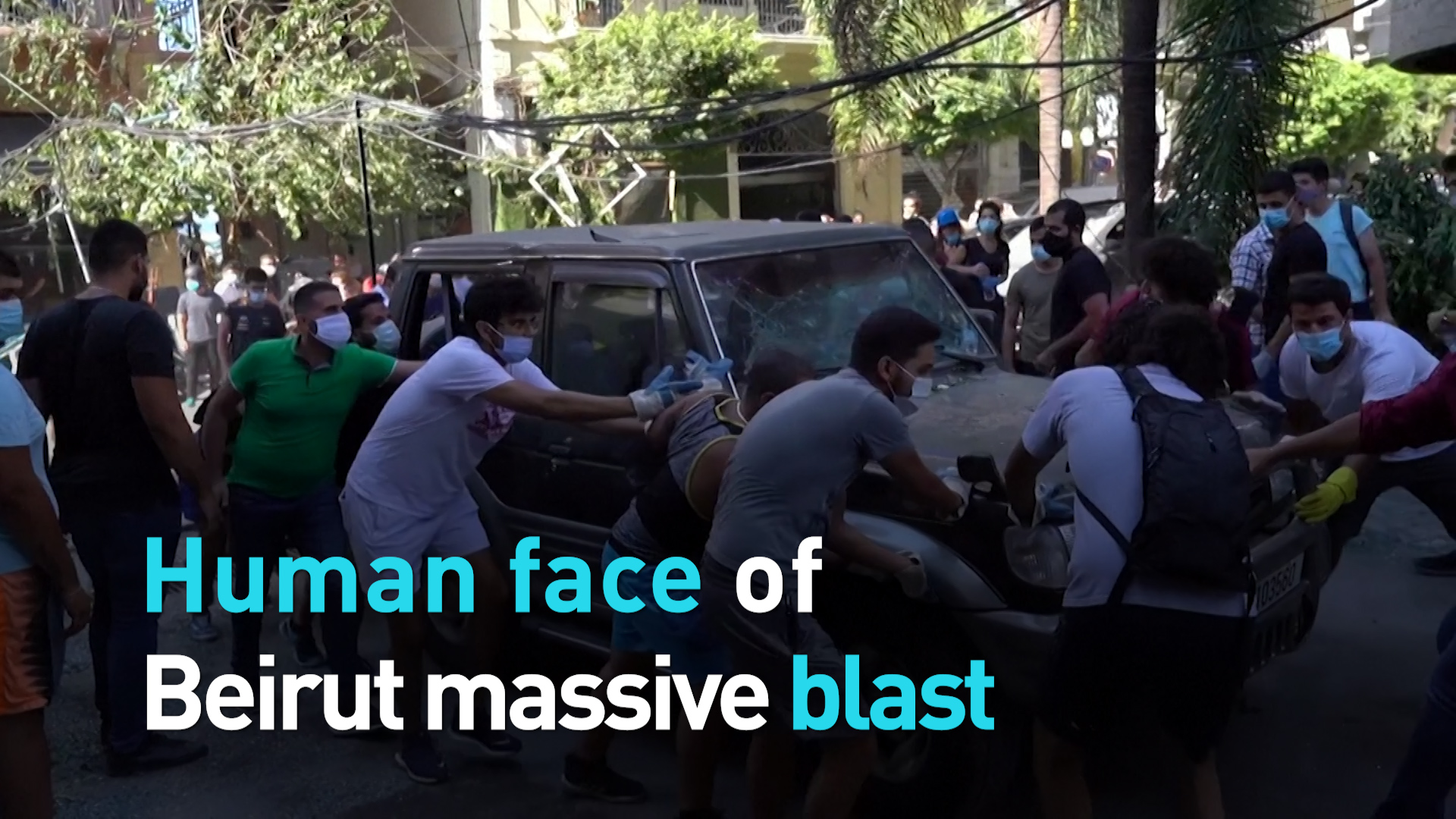
Thousands are homeless after Tuesday's powerful and destructive explosion in Beirut.
At least 157 people were killed and 5,000 injured, with the death toll expected to rise.
The Lebanese president has promised a transparent investigation.
Wednesday, local residents began the long process of rebuilding and cleaning up debris-filled streets.
Videos on social media captured the moment of the massive blast and how people reacted to the disaster.
This video shows the human faces of Beirut.
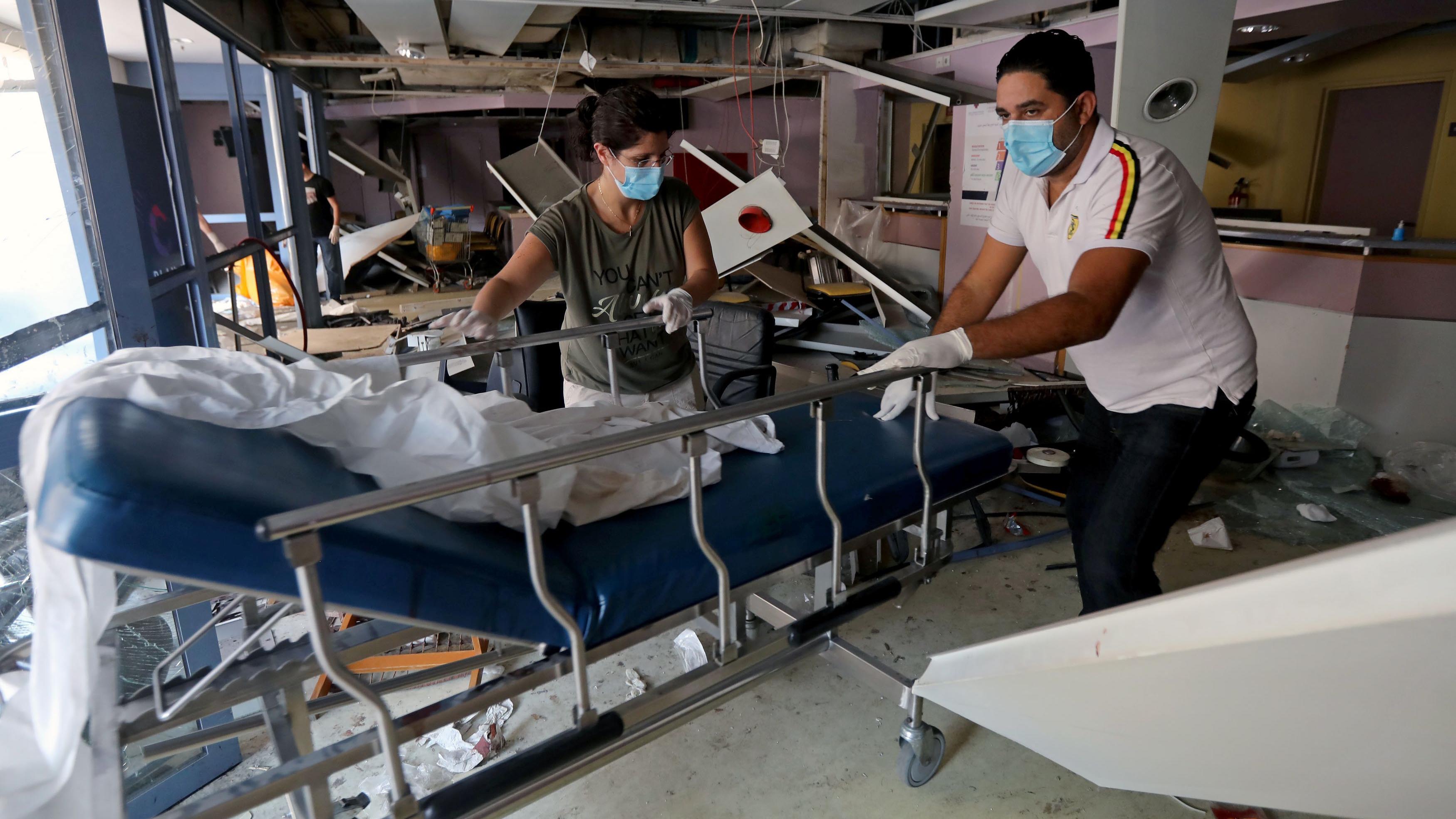
"Lebanon is facing major challenges especially on the level of its health system," said Randa Yassir, a consultant at International Civil Society Action Network.
Yassir said Beirut has 12 hospitals, and rising numbers of COVID-19 infections have already put much pressure on the city's hospitals in recent weeks. Besides, some hospitals have been affected by Tuesday's blast, with some medical personnel killed or injured.

Looking radiant in a long white gown and veil, Lebanese bride Israa Seblani stood smiling, posing for her wedding video. The scene was quickly shattered by a deafening roar caused by an explosion that was followed by a powerful shockwave that nearly blew her off her feet. The blast blew away the bouquet and the bottom of her dress. The bride immediately ran away to safety. No one in the wedding party was hurt.
A German diplomat was killed in Tuesday's twin blasts in the Lebanese capital of Beirut, the German Foreign Ministry said on Thursday.
"Our worst fears have been confirmed. A member of our embassy in Beirut was killed in her home in the aftermath of the explosion," the country's Foreign Minister Heiko Maas said in a statement on Germany's first confirmed fatality from the blast.
The explosion at Port of Beirut killed at least 137 and injured 5,000 as of Thursday.
(With input from agencies)
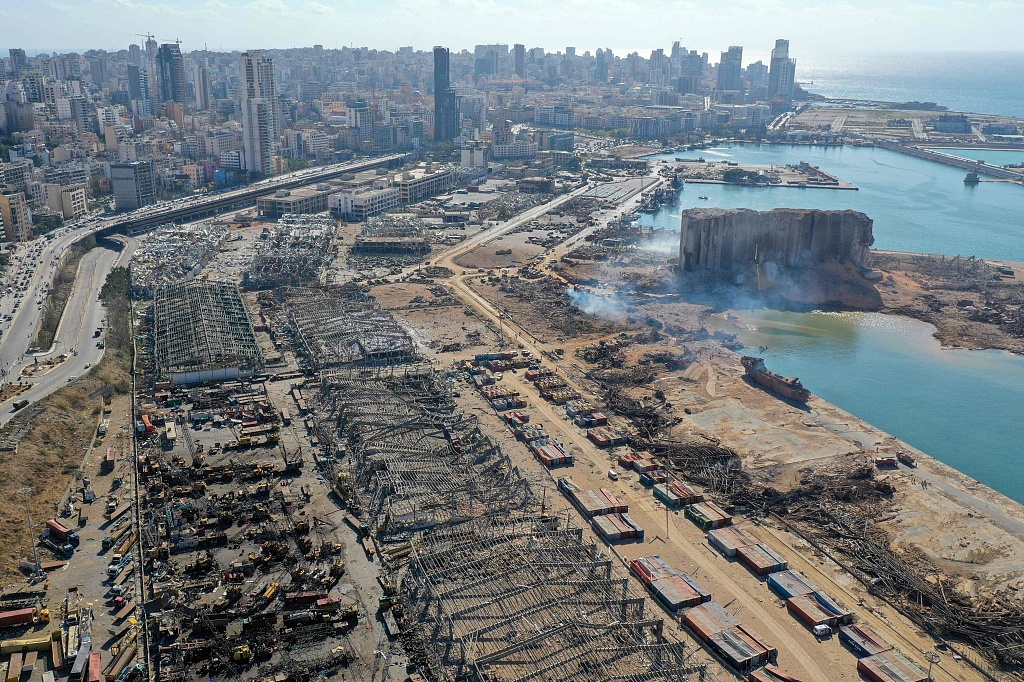
WHO dispatches 20 tonnes of supplies to support Beirut
A plane carrying 20 tonnes of supplies from the World Health Organization (WHO) landed in Lebanon's capital Beirut Wednesday.
WHO's Eastern Mediterranean Regional Office said on Twitter that the supplies will "support treatment of patients suffering from injuries and burns as a result of the massive blast."
The office also noted that the supplies will cover 1,000 trauma interventions as well as 1,000 surgical interventions for patients.
Three hospitals in Beirut are not able operate and two hospitals are partially damaged due to the impact of the blast and those injured are being transferred to hospitals in other cities because of lack of beds.
(Cover: CFP)
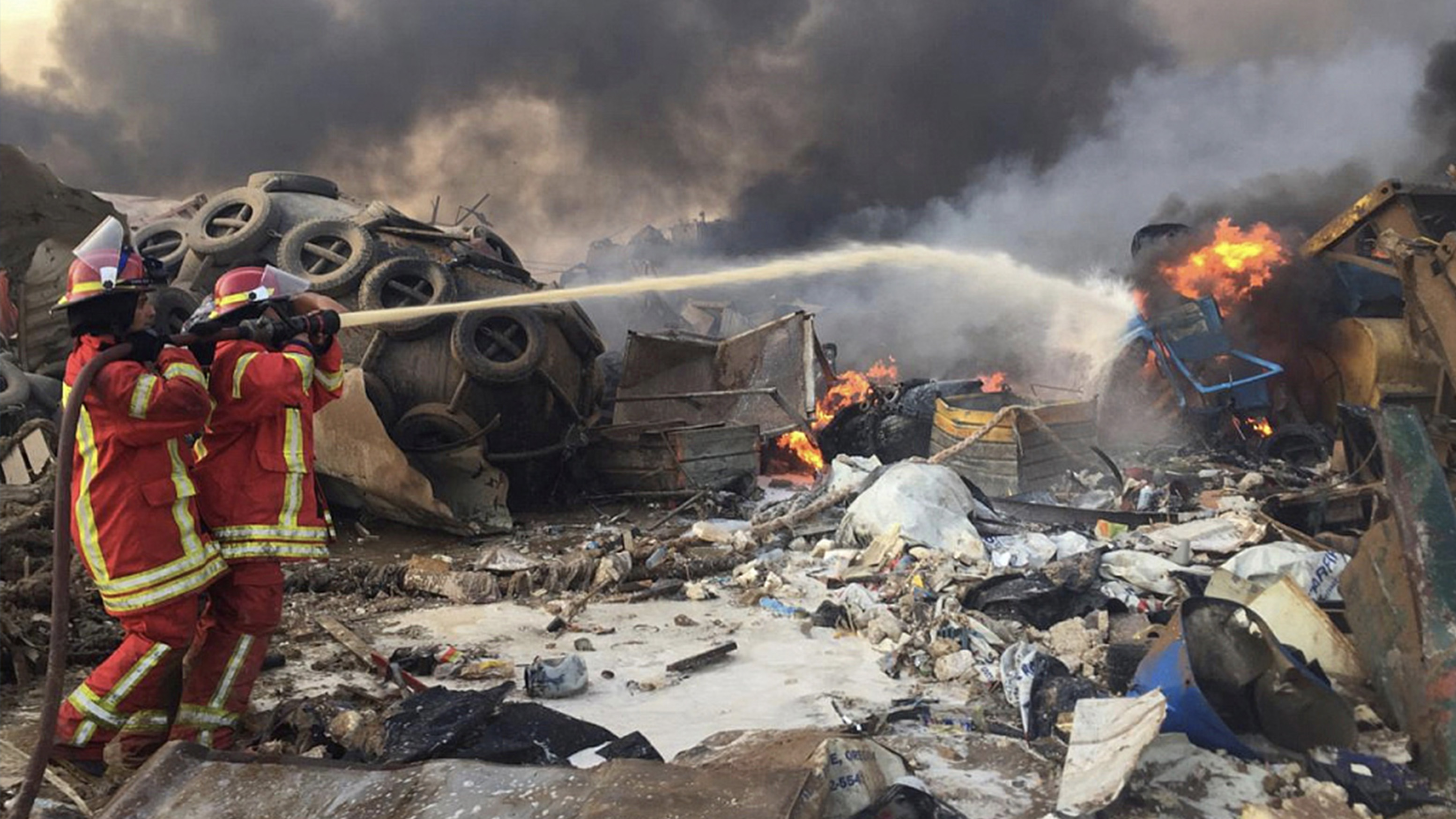
French President Emmanuel Macron arrived in Lebanon on Thursday for a snap visit of support, two days after a huge blast caused immense destruction in Beirut.
"I want to organize European cooperation and, more broadly, international cooperation," Macron said upon arrival in the Lebanese capital, where he planned to stay just a few hours to survey the site of the explosion and meet the country's top officials.
Macron said Lebanon was facing political and economic crises, and that it would continue to suffer unless it enacted reforms. Macron was speaking to reporters in Beirut, after his plane touched down at the start of an official visit.
Two days on, Lebanon is still reeling from a blast so huge it was felt in neighboring countries, its mushroom-shaped cloud drawing comparisons with Hiroshima and the devastation caused by its shockwave with the scene of an earthquake.
Read more:
Live update: Beirut blast death toll rises to 137; countries around the world offer aid
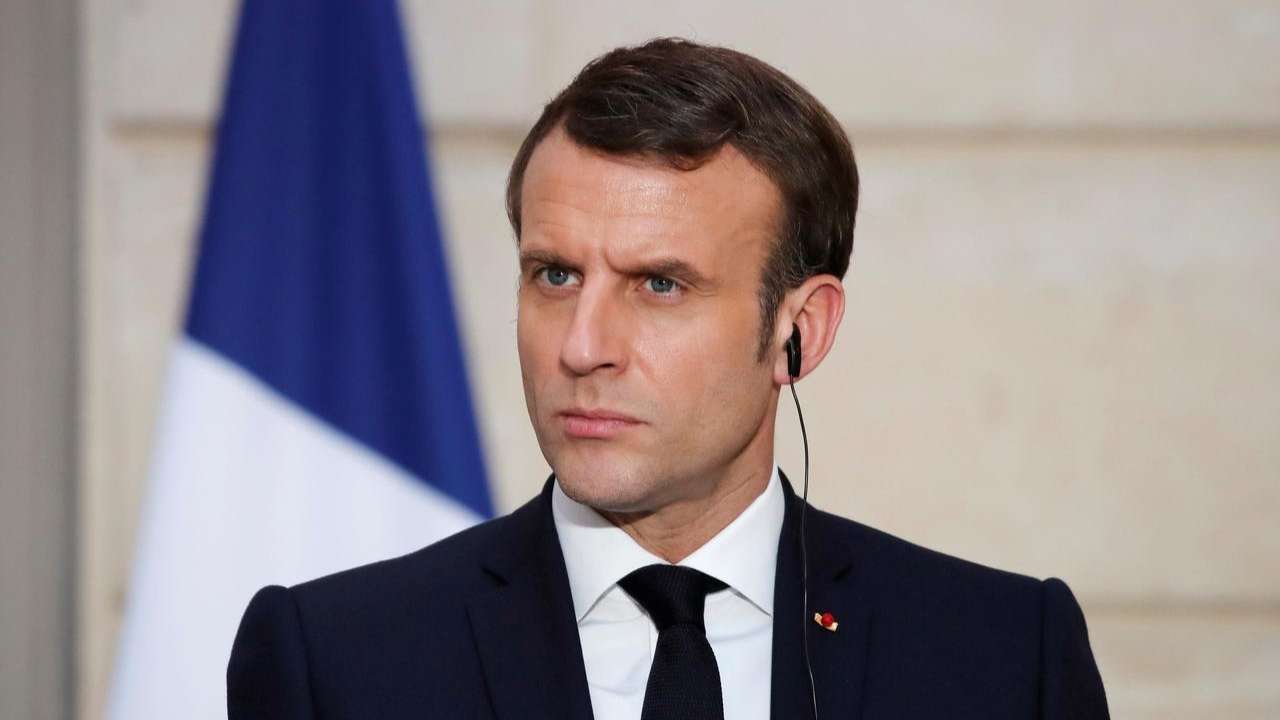
French President Emmanuel Macron. /AFP
French Prime Minister Jean Castex held a meeting on Wednesday to organize France's aid for Lebanon and Foreign Minister Jean-Yves Le Drian said France stood "alongside Lebanon" and was ready to help it.
Meanwhile, the European Commission is ready to help Lebanon with preferential trade and customs backing, the head of the EU's executive arm said on Thursday after a phone call with Lebanese Prime Minister Hassan Diab.
The 27-country bloc has deployed more than 100 firefighters, a military vessel for medical evacuation and activated its Copernicus Satellite mapping system to help assess the damage.
Lebanon is a former French protectorate and the countries retain close political and economic ties.
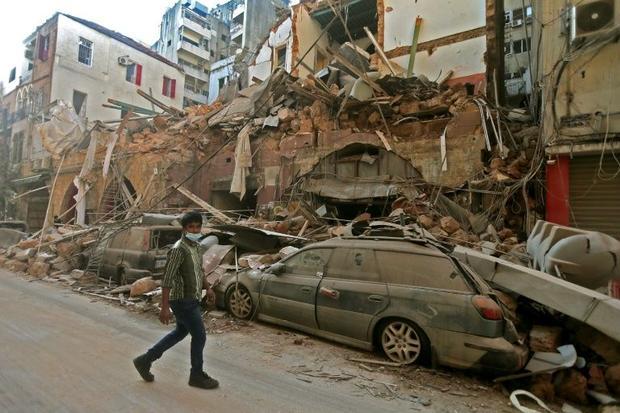
Lebanon's government has announced a two-week state of emergency following the blast that killed at least 137 people. /AP
Lebanon's government has announced a two-week state of emergency following the blast that killed at least 137 people and injured more than 5,000, according to the Lebanese Red Cross. The Beirut governor estimated up to 300,000 people may have been made temporarily homeless by the destruction, which he said would cost the debt-ridden country in excess of three billion U.S. dollars.
Many questions were being asked as to how such a huge cargo of highly explosive material could have been left unsecured in Beirut for years.
The government of Lebanon has given an "investigative committee" four days to determine responsibility for the devastating explosion, Foreign Minister Charbel Wehbe told French radio Thursday.
"This morning, a decision was taken to create an investigative committee which in four days maximum must provide a detailed report on responsibility – how, who, what, where? There will be judicial decisions," he told media. "It is serious, and we take it seriously."
"Those responsible for this horrible crime of negligence will be punished by a committee of judges," he added.
With dozens of people still missing, the number of victims was expected to rise as rescue workers continued to comb through the rubble.
(With input from agencies)
Lebanon blast killed at least 137, injured 5,000: ministry
The huge blast at Beirut port has killed at least 137 people, left dozens missing, and at least 5,000 wounded, a Lebanese health ministry spokesperson said Thursday.
Tuesday's explosion obliterated part of the port and caused damage over a wide radius in the heart of the city, prompting fears the final death toll could yet rise significantly.
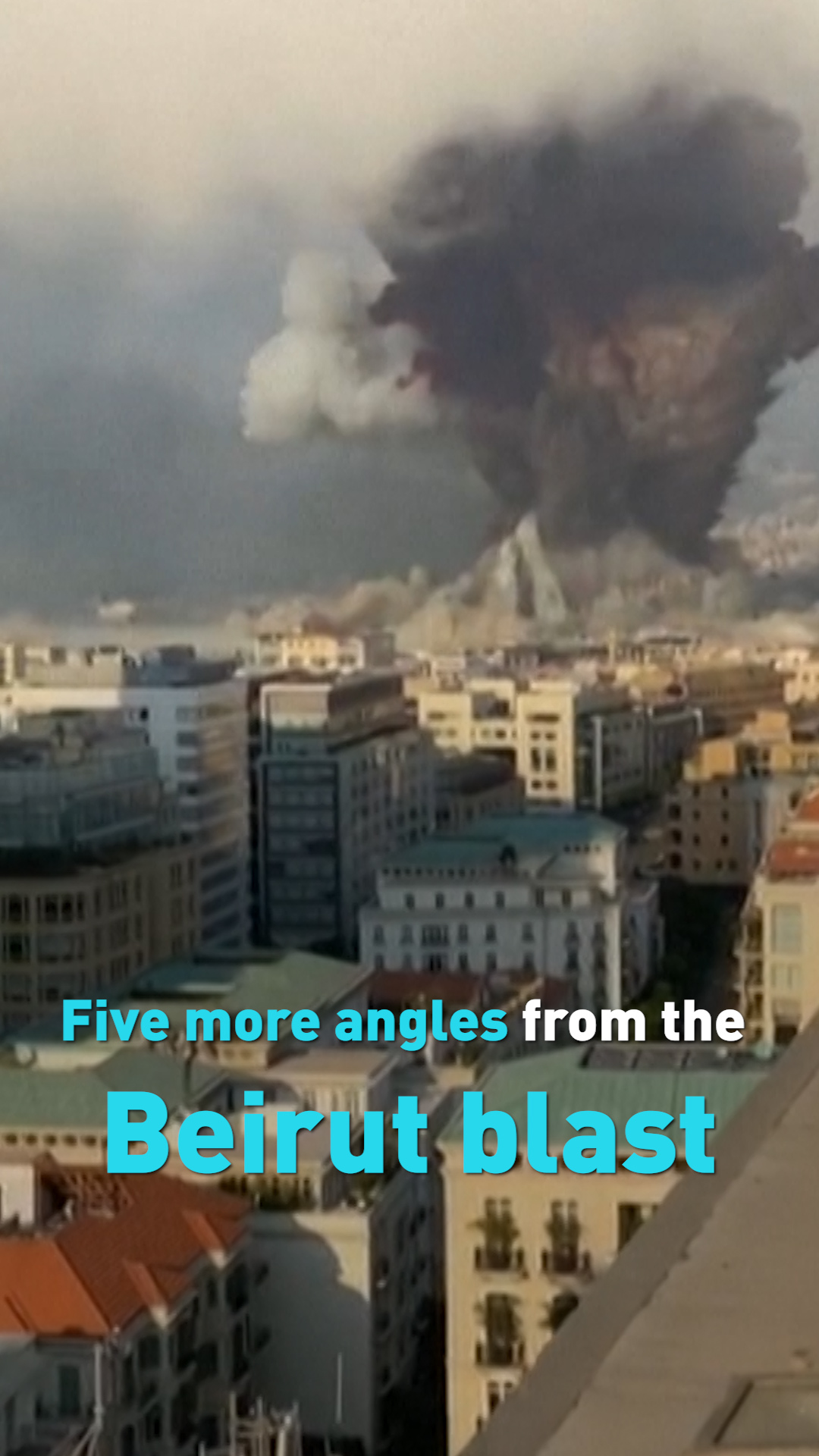
Here are five videos from people on the ground in Beirut after a massive and devastating explosion rocked one of the city’s ports.
Check out The China Report, our new weekly newsletter. Subscribe here!
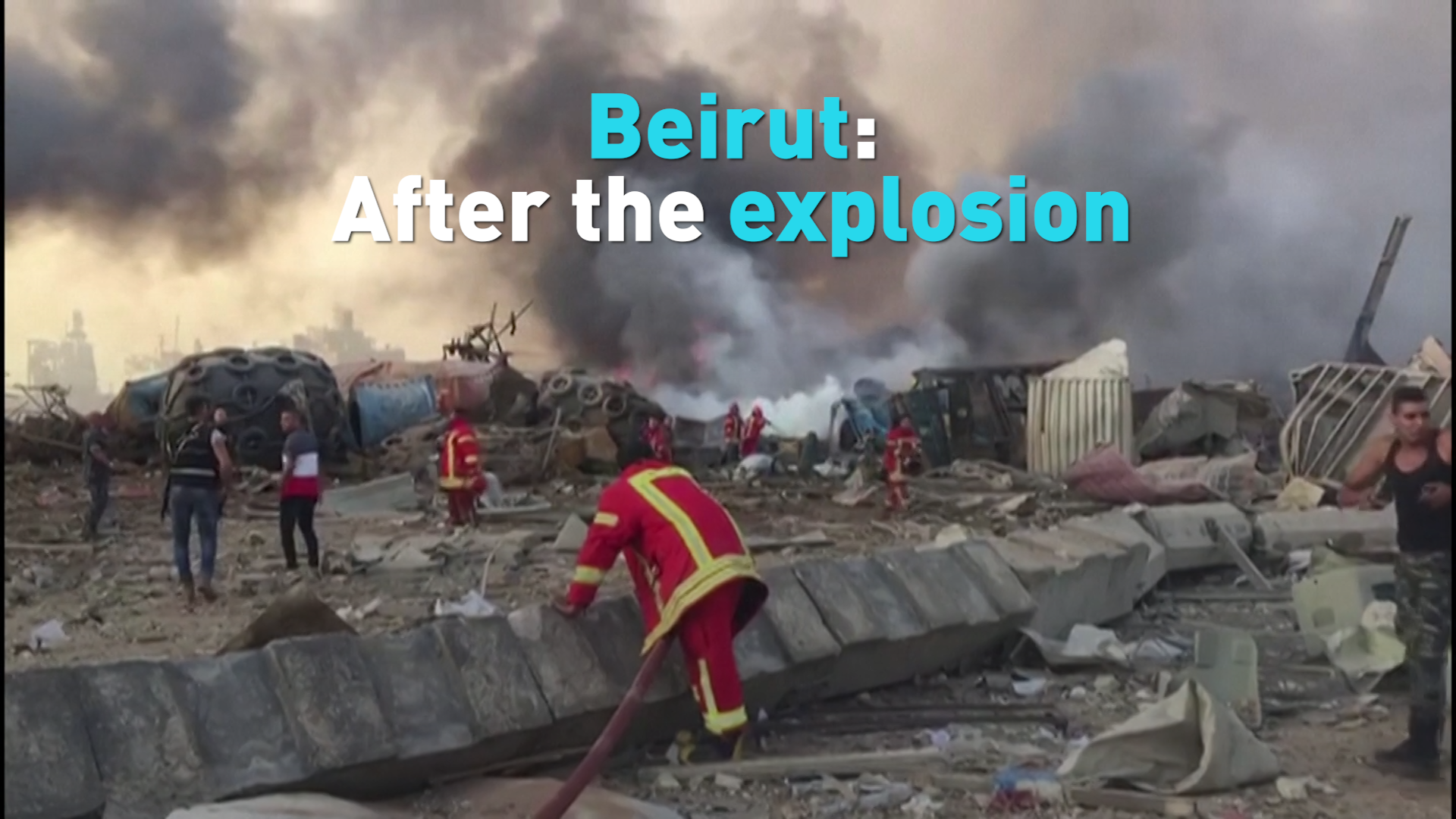
Rescuers in Lebanon continue to dig for survivors after Tuesday's deadly blast in the capital, Beirut.
Officials believe a large supply of confiscated ammonium nitrate that was stored in a port hanger is to blame for the blast.
The Associated Press reports an official letter circulated online showed the head of the customs department had warned repeatedly that the stockpile of ammonium nitrate was hazardous and needed to be removed.
Several letters were sent, asking how the nitrate could be removed but it is not known if there was a response.
The state prosecutor, Ghassan Oueidat, has ordered security agencies to collect all reports, letters and related materials for an immediate investigation.
Lebanon is already facing an economic crisis with an unemployment rate surging past 30% and a major decline in the value of its currency.
Officials are worried the blast could lead to food insecurity since the country imports most of its goods and its main port was destroyed in the blast.
Check out The China Report, our new weekly newsletter. Subscribe here!
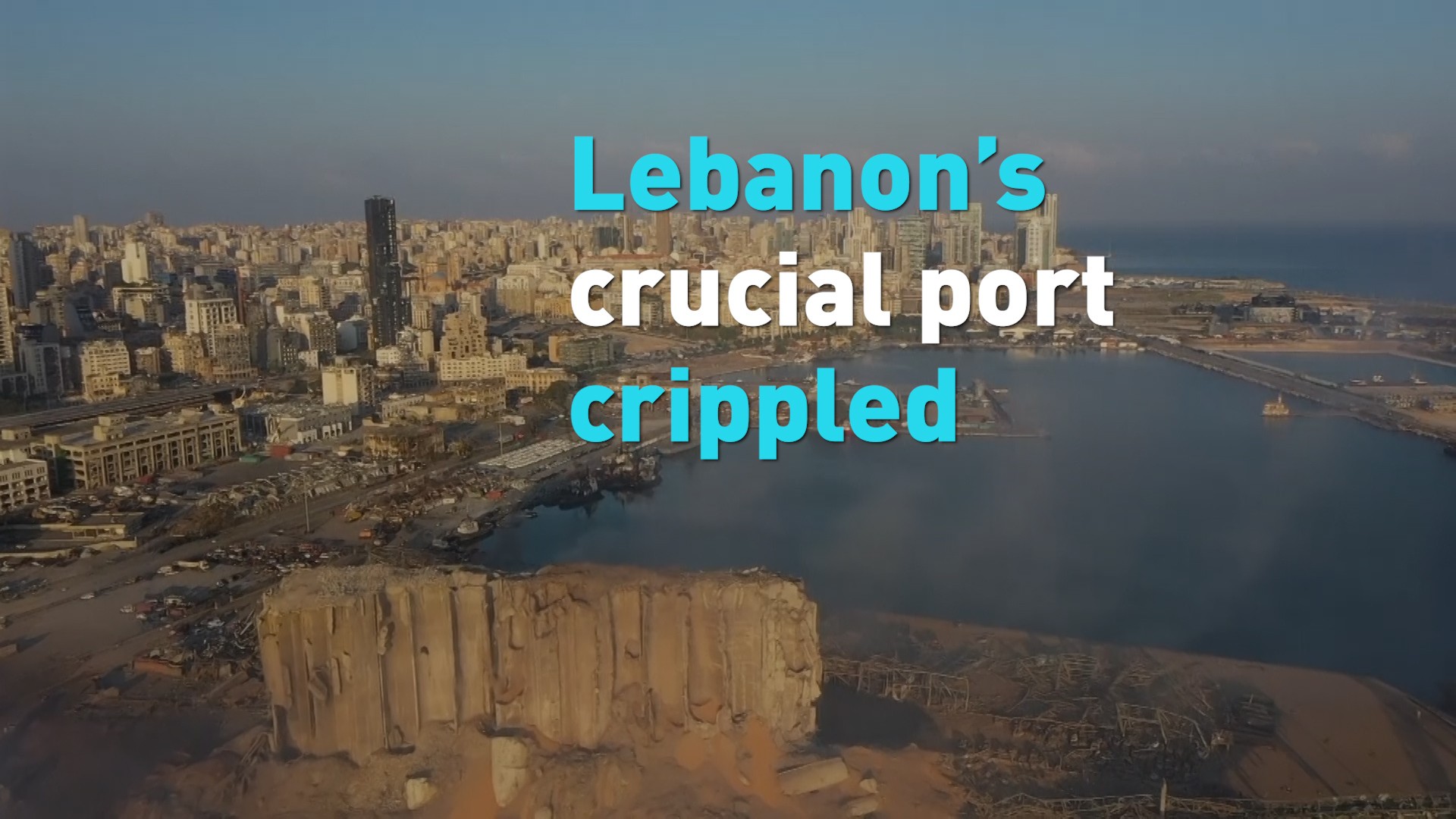
Authorities say the massive explosion in Beirut took place in a warehouse where 2,750 tons of ammonium nitrate was impounded.
That was next to the port, a crucial economic artery for Lebanon.
The port is the major route of trade for Lebanon, this infrastructure is totally destroyed.
Check out The China Report, our new weekly newsletter. Subscribe here!

Smoke and damage are pictured at the site of a massive explosion in Beirut's port area, Lebanon, August 4, 2020. /Reuters
Lebanon's cabinet has handed control of Beirut's security to the military following Tuesday's massive explosions that sent shockwaves across the city.
As of Wednesday evening, the death toll from the blasts stood at 135 people with over 4,000 injured and dozens still missing.
According to Governor Abboud, at least 300,000 people have been displaced from their homes by the devastating explosions.
The cause of the blast is being investigated, but Lebanon's Prime Minister, Hassan Diab, said the cause of the explosion was 2,700 tonnes of ammonium nitrate stored in a warehouse for six years. President Michel Aoun tweeted it was "unacceptable" the explosives had been stored unsafely. Aoun declared three days of mourning and called for a two-week state of emergency.
Lebanon's cabinet also agreed to place all port officials who oversaw storage and security since 2014 under house arrest, according to local media reports.
"We call on the military leadership to impose house arrest on all those who organised the storage of ammonium nitrate" at Beirut's port, Information Minister Manal Abdel Samad said.
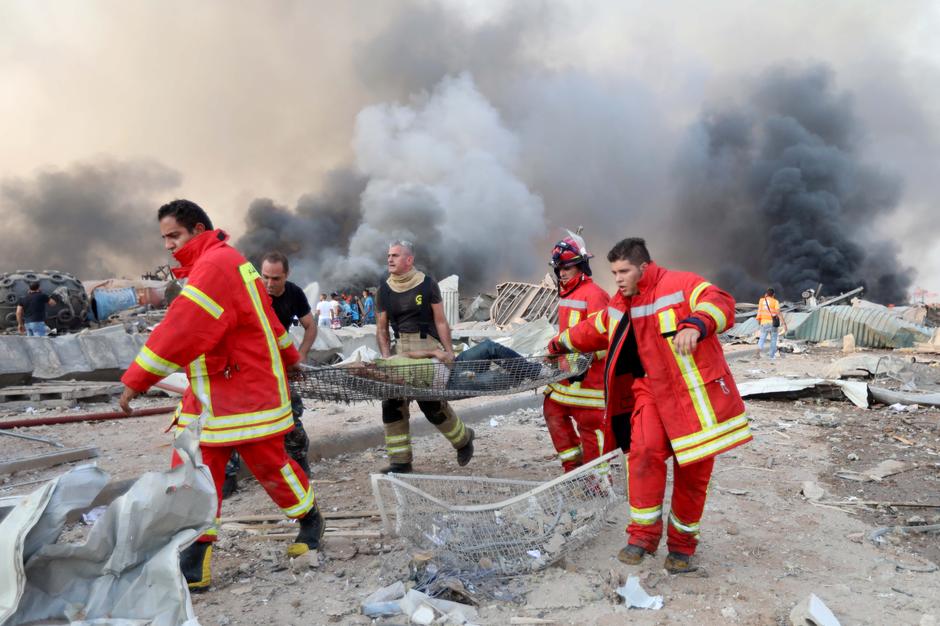
An injured man is being carried by rescuers out of the site of an explosion in Beirut, Lebanon, August 4, 2020. /Reuters
World offers support, condolences to Lebanon
Countries dispatched emergency medical aid, pop-up field hospitals, rescue experts and tracking dogs to Lebanon on Wednesday.
Gulf states were among the first to respond, with Qatar sending mobile hospitals to ease pressure on Lebanon's medical system, already strained by the coronavirus pandemic.
Kuwait also sent medical supplies as the Lebanese Red Cross said more than 4,000 people were being treated for injuries after the explosion, which sent glass shards and debris flying.
A Greek C-130 army transport plane bearing a dozen rescuers landed at Beirut's airport, itself damaged in the catastrophic explosion.
The medical unit of the Chinese peacekeeping forces stationed in Lebanon said Wednesday said it's ready and will head to Beirut, carrying medical supplies and protective equipment.
Read more: Xi sends condolences to Lebanese president over massive blast
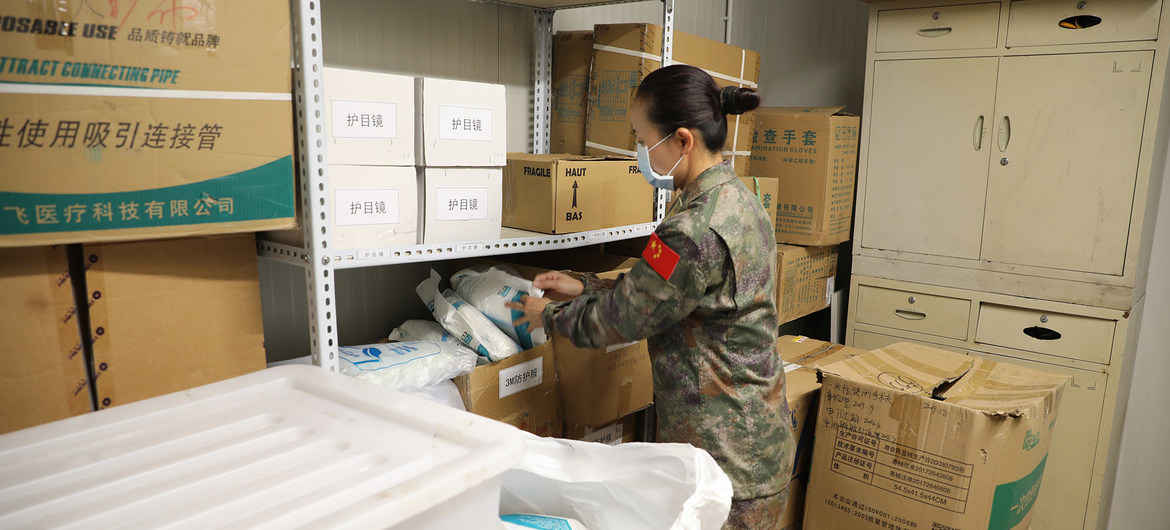
A medical unit of the Chinese peacekeeping forces to Lebanon prepares medical supplies and protective equipment, August 5, 2020. /Photo via UN website
Lebanon's Prime Minister Hassan Diab has called on "friendly countries" to support a nation already reeling from its worst economic crisis in decades as well as a coronavirus outbreak that has infected over 5,000 people and killed 68.
From Europe, authorities in the Netherlands, the Czech Republic and Poland offered an array of assistance including doctors, police and firefighters, together with rescue experts and sniffer dogs.
Chancellor Angela Merkel on Wednesday also promised Germany's help to Lebanon.
Italy said it had sent 14 firefighters specialized in assessing chemical risks and damaged structures to provide technical support.
France said it was sending search and rescue experts aboard three military planes loaded with a mobile clinic and tonnes of medical and sanitary supplies.
President Emmanuel Macron is to travel to Lebanon on Thursday, the first world leader to do so after the disaster, as France seeks to swiftly push reconstruction in the country. "France is at the side of Lebanon. Always," Macron tweeted in Arabic.
Prosecutors in France also opened an investigation into the blast, which wounded 21 French citizens.
Britain's Queen Elizabeth II sent a message of condolence to the president of Lebanon, saying she was "deeply saddened" by the blast.
The World Health Organization also said it was sending trauma and surgical kits from its Dubai base after the "shocking event" that comes at a "particularly difficult time in Lebanon."
(With input from agencies)

Smoke rises from the site of an explosion in Beirut's port area, Lebanon, August 4, 2020. /Reuters
China has tasked a team of medical experts in Lebanon to join in the rescue operations in the capital, Beirut, following Tuesday's deadly explosions.
Following the blasts, the 18th Chinese peacekeeping medical team to Lebanon received a notice from the United Nations Interim Force in Lebanon (UNIFIL) Command that it would deploy its medical force to provide medical aids to Beirut.
After receiving the notice, the team transferred 9 medical staffs from the fields of surgery, internal medicine, burns, anesthesiology and other fields to form the "Beirut explosion" emergency medical team. The emergency team will bring medicines, consumables, protective equipment and other materials to Beirut. At this stage, team staffs, vehicles, and materials are ready.
China's 18th batch of medical units for peacekeeping missions to Lebanon is composed of 30 officers and soldiers. It is currently in the rotation period, and 15 of them returned to China on 28 July. According to the plan, the remaining 15 people will set off to return home on 18 August. 15 Chinese medical teams from China's 19th batch of peacekeeping missions to Lebanon arrived in Lebanon on 28 July and are currently in isolation due to the new crown epidemic.
The twin blasts at the Port of Beirut killed at least 113 people and injured over 4,000 others, with dozens still missing.
According to Beirut Governor Marwan Abboud, at least 300,000 people have been displaced from their homes by the devastating explosions.
Earlier, Chinese President Xi Jinping sent a message of condolence to his Lebanese counterpart Michel Aoun following the blasts.
In his message, Xi said he was shocked to learn about the huge explosions in Beirut, whose effects were felt many kilometers away from the port.
On behalf of the Chinese government and people and in his own name, Xi extended profound condolences to the victims, conveyed heartfelt sympathies to the bereaved families and the injured, and wished the injured a quick recovery.
The cause of the blast is being investigated. But Lebanon's prime minister, Hassan Diab, said the cause of the explosion was 2,700 tonnes of ammonium nitrate stored in a warehouse for six years. President Michel Aoun tweeted it was "unacceptable" the explosives had been stored unsafely. Aoun declared three days of mourning and called for a two-week state of emergency.
(With input from agencies)
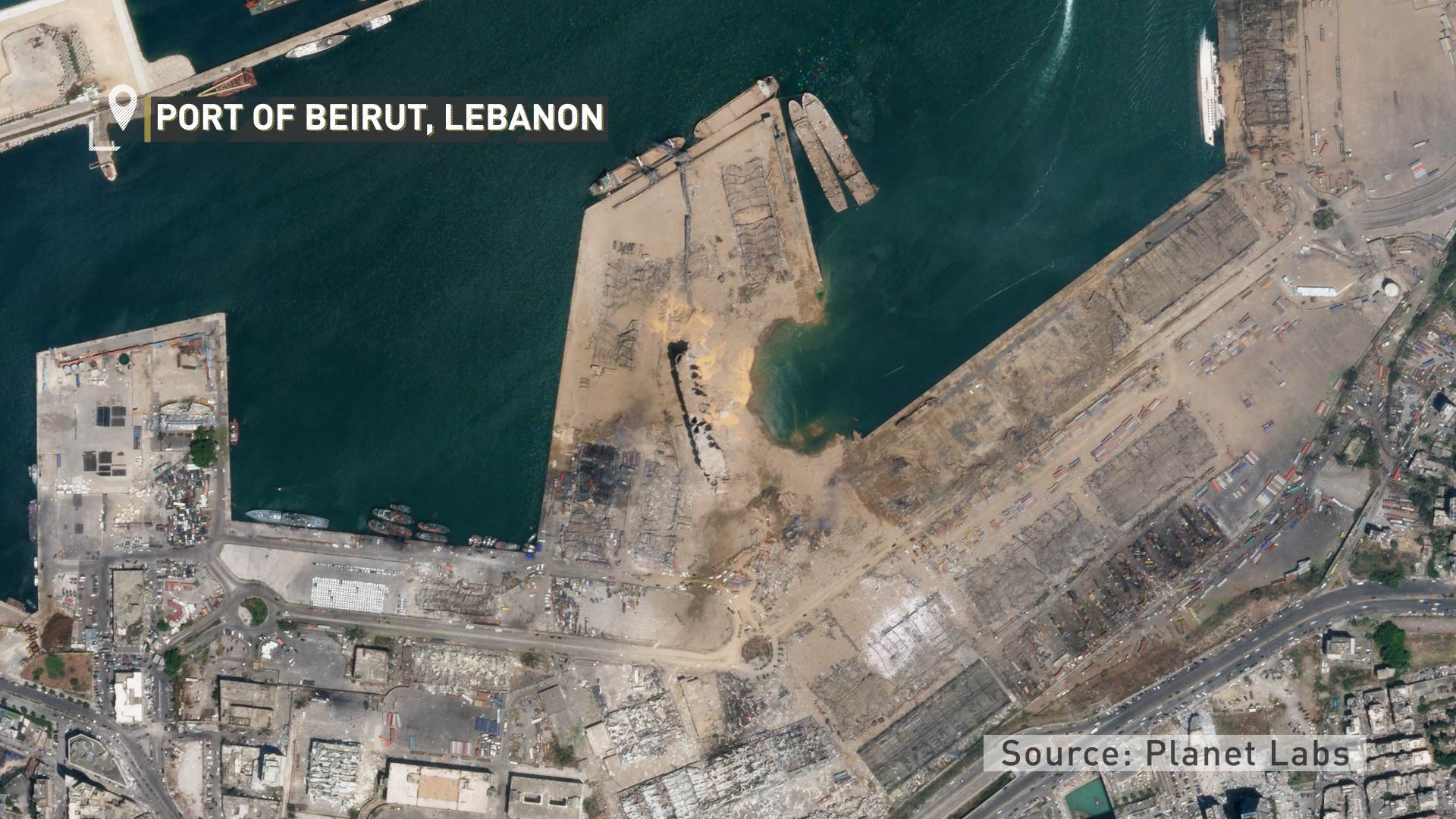
Hours after a huge explosion in Beirut, neighboring countries and European states offered the city aid and medical assistance.
The blasts at Beirut's port killed over 100 people, injured 4,000 more, left around 300,000 people homeless and caused damage estimated to be worth up $5 billion.
The numbers of dead and injured are still rising.
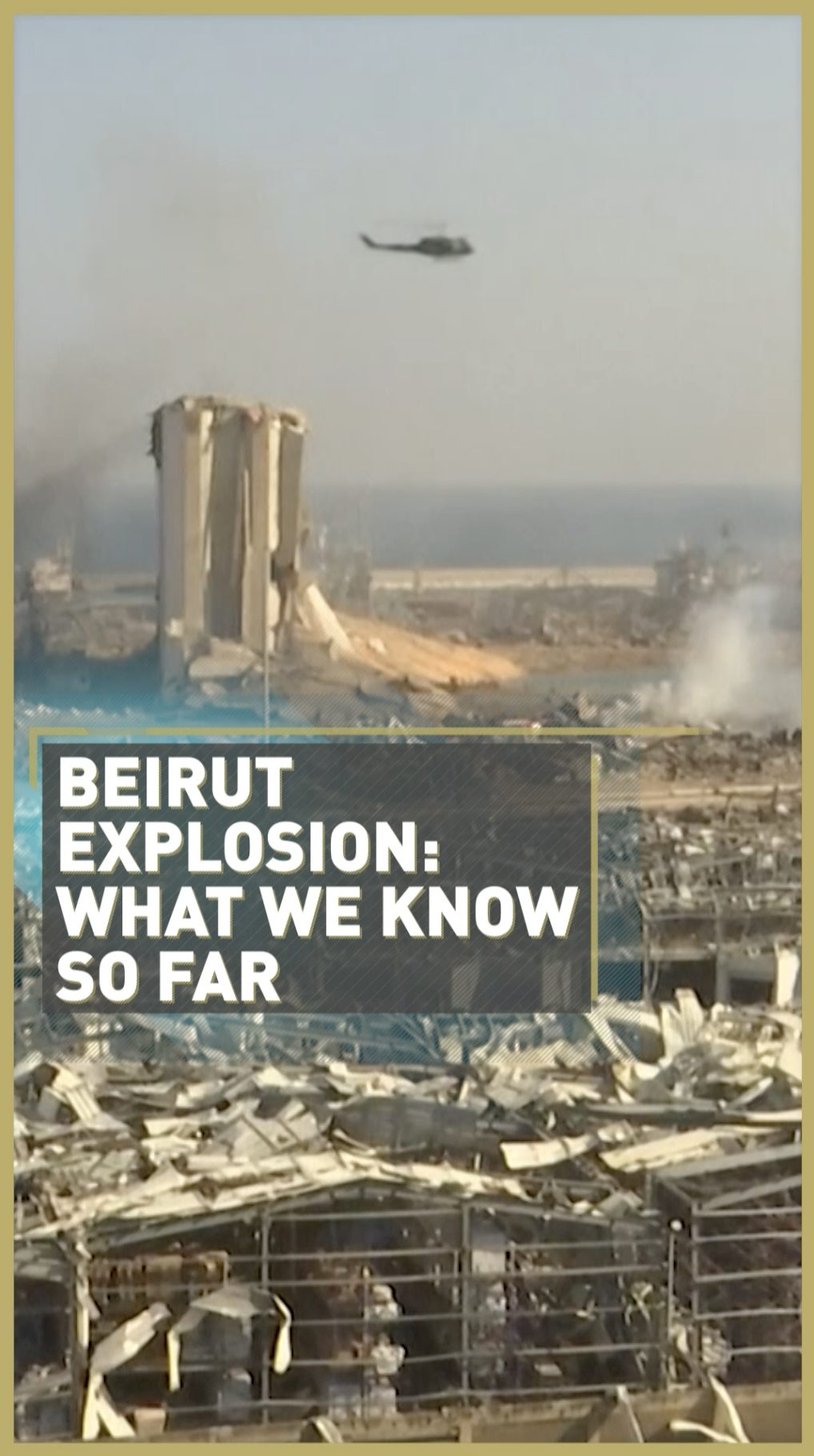
France's President Emmanuel Macron was quick to show his support and has already announced plans to visit Lebanon on 6 August, two days after the explosion.
And two hours after the blast, at 6 p.m. local time, he wrote on Facebook to express his solidarity with Lebanon in both Arabic and French.
"I express my fraternal solidarity with the Lebanese after the explosion that caused so many victims and damage tonight in Beirut," he said.
"France stands alongside Lebanon. Always. Always. French aid and means are being transported to the spot."

The Lebanon prime minister has claimed the explosion was caused by 2,750 tons of ammonium nitrate. /AFP

The blast came from a major port in Beirut, which is close to shopping centers and nightlife districts. /AFP

An image of one of the hospitals that was damaged by the explosion on 4 August. /AFP

French rescue workers before boarding a plane to Beirut. /AFP/ Bertrand Guay
The country sent two military planes to Lebanon this morning, with 55 emergency response experts on board, in addition to a mobile clinic able to treat 500 people at a time and an additional 15 tons of sanitary equipment.
Medical aid and equipment is needed in Lebanon because the country's hospitals were already overwhelmed by COVID-19 patients before the blast.
Several hospitals were also damaged and the Lebanese Red Cross is working with the country's Health Ministry to create emergency morgues because hospitals cannot deal with the influx of patients.
In addition, the European Union is sending rescue workers to Beirut.
The European commissioner for crisis management, Janez Lenarcic, said after the blasts: "The EU Civil Protection Mechanism is now coordinating the urgent deployment of over 100 highly trained firefighters, with vehicles, dogs and equipment, specialized in search and rescue in urban contexts.
"They will work with the Lebanese authorities to save lives on the ground."
Other European countries have also pledged their support. The Netherlands is sending a rescue team to the capital, including 67 firemen, police officers, doctors and nurses.
They will assist Lebanese emergency response workers as they look for people buried under debris.
Czechia will also send 36 rescue workers.

Lebanese rescue workers near the site of the explosion. The country's Red Cross has asked locals to donate blood. /Reuters
Russia will send five planes with medical equipment, medical personnel and a field hospital, while neighboring Turkey, Kuwait, Qatar and Iran have already sent medical aid.
The UK has said it is ready to offer aid to Lebanon, including to British nationals in Beirut, but has yet announced what that aid will look like.
Israel has also offered aid to Lebanon, despite tensions between the two countries.

Firefighters spray water at a fire after an explosion in Beirut, Lebanon, August 4, 2020. /Reuters
Beirut Governor Marwan Abboud on Wednesday estimated that the deadly blasts that rocked the Lebanese capital on Tuesday cost the city 3 to 5 billion U.S. dollars in material losses, the National News Agency reported.
Two explosions hit the Port of Beirut at around 6:10 p.m. local time (1610 GMT), shaking buildings all over the city, and causing massive casualties and damages.
The blasts killed at least 113 people and injured over 4,000 others, with dozens still missing.
According to Governor Abboud, at least 300,000 people have been displaced from their homes by the devastating explosions.
The cause of the blast is being investigated, but Lebanon's Prime Minister, Hassan Diab, said the cause of the explosion was 2,700 tonnes of ammonium nitrate stored in a warehouse for six years. President Michel Aoun tweeted it was "unacceptable" the explosives had been stored unsafely. Aoun declared three days of mourning and called for a two-week state of emergency.
Death toll from Beirut blast reaches 113, dozens still missing
The death toll from Beirut explosion has reached 113, with dozens still unaccounted for, local media reported, citing Lebanese Health Minister Hamad Hassan on Wednesday.
Meanwhile, Lebanon's cabinet has agreed to place all port officials who oversaw storage and security since 2014 under house arrest, according to local media reports.
French president to visit Lebanon
French President Emmanuel Macron will head to Lebanon on Thursday and will meet with local politicians, AFP reported on Wednesday citing the French Presidency.
International aid heads to Lebanon after deadly blast
International aid has been pouring into Lebanon a day after a massive explosion devastated Beirut's port on Tuesday, killing at least 100 people and wounding thousands.
The Chinese Foreign Ministry said the country is willing to provide assistance within its capacity and sent China's deep and sincere condolences to the victims, the injured and the families of the victims, according spokesperson Wang Wenbin at a press conference on Wednesday.
Russia's emergency officials also said the country will send five planeloads of aid and will send rescuers, medical workers, a makeshift hospital and a lab for coronavirus testing to Lebanon.
Click here for more
Lebanese president calls for assistance to cope with humanitarian crisis
Lebanon President Michel Aoun vowed to thoroughly investigate the blast and hold those responsible accountable, in a televised broadcast on Wednesday.
He also called on the international community to speed up assistance to the country to help it cope with the humanitarian crisis.
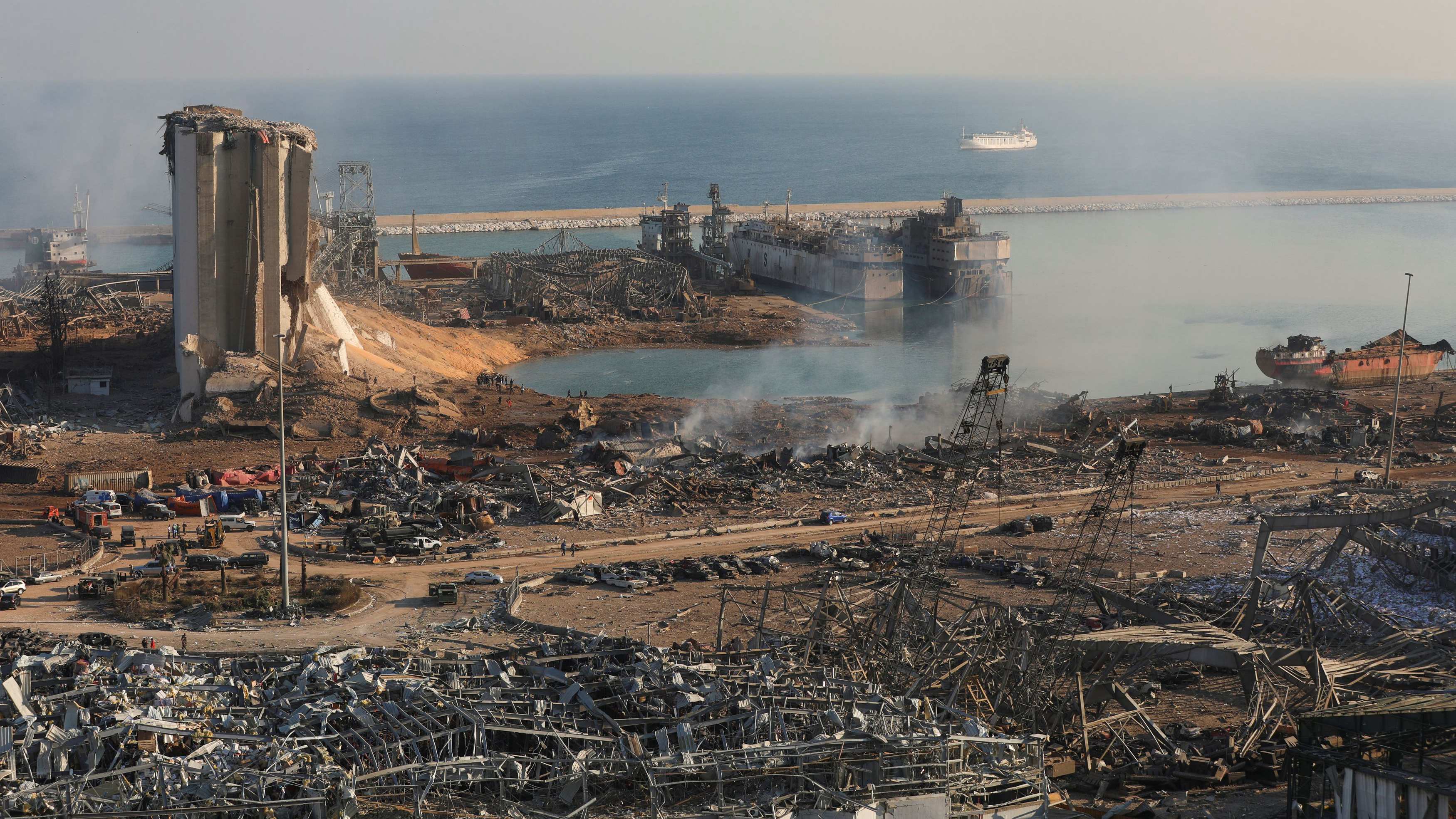
A general view shows the damage at the site of Tuesday's blast in Beirut's port area, Lebanon, August 5, 2020. /Reuters
Chinese President Xi Jinping on Wednesday sent a message of condolences to his Lebanese counterpart Michel Aoun over a massive blast that ripped through Beirut killing at least 100 people.
In his message, Xi said he was shocked to learn about the huge explosions in Beirut, which caused heavy casualties.
On behalf of the Chinese government and people and in his own name, Xi extended profound condolences to the victims, conveyed heartfelt sympathies to the bereaved families and the injured, and wished the injured a quick recovery.
(With input from Xinhua)
Beirut's governor: Blast causes up to $5 billion worth of damage
Tuesday's massive explosion in the Lebanese capital has resulted in an estimated three to five billion U.S. dollars' worth of damage, Beirut governor Marwan Abboud told local media Wednesday.
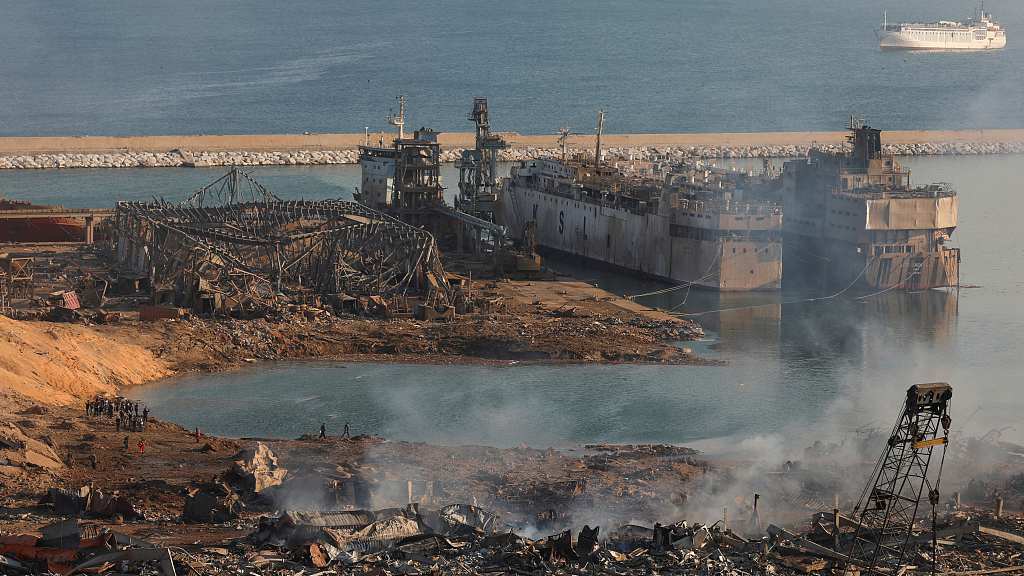
China extends deep condolences to victims of Beirut blast: Foreign Ministry
The Chinese Foreign Ministry on Wednesday expressed deep condolences to the victims of the huge explosion that rocked Lebanese capital Beirut on Tuesday, saying China is ready to provide assistance within its capacity to Lebanon.
We extend sincere sympathy to the injured and the families of the victims and wish a speedy recovery for those injured, Wang Wenbin, a spokesperson for the ministry, said at a regular briefing.
Chinese national injured in Beirut blast
A Chinese national sustained a slight injury after a massive explosion rocked the Lebanese capital of Beirut on Tuesday evening, the Chinese Embassy in the country said on Wednesday.
Before and after the blast in the Lebanese capital, Beirut
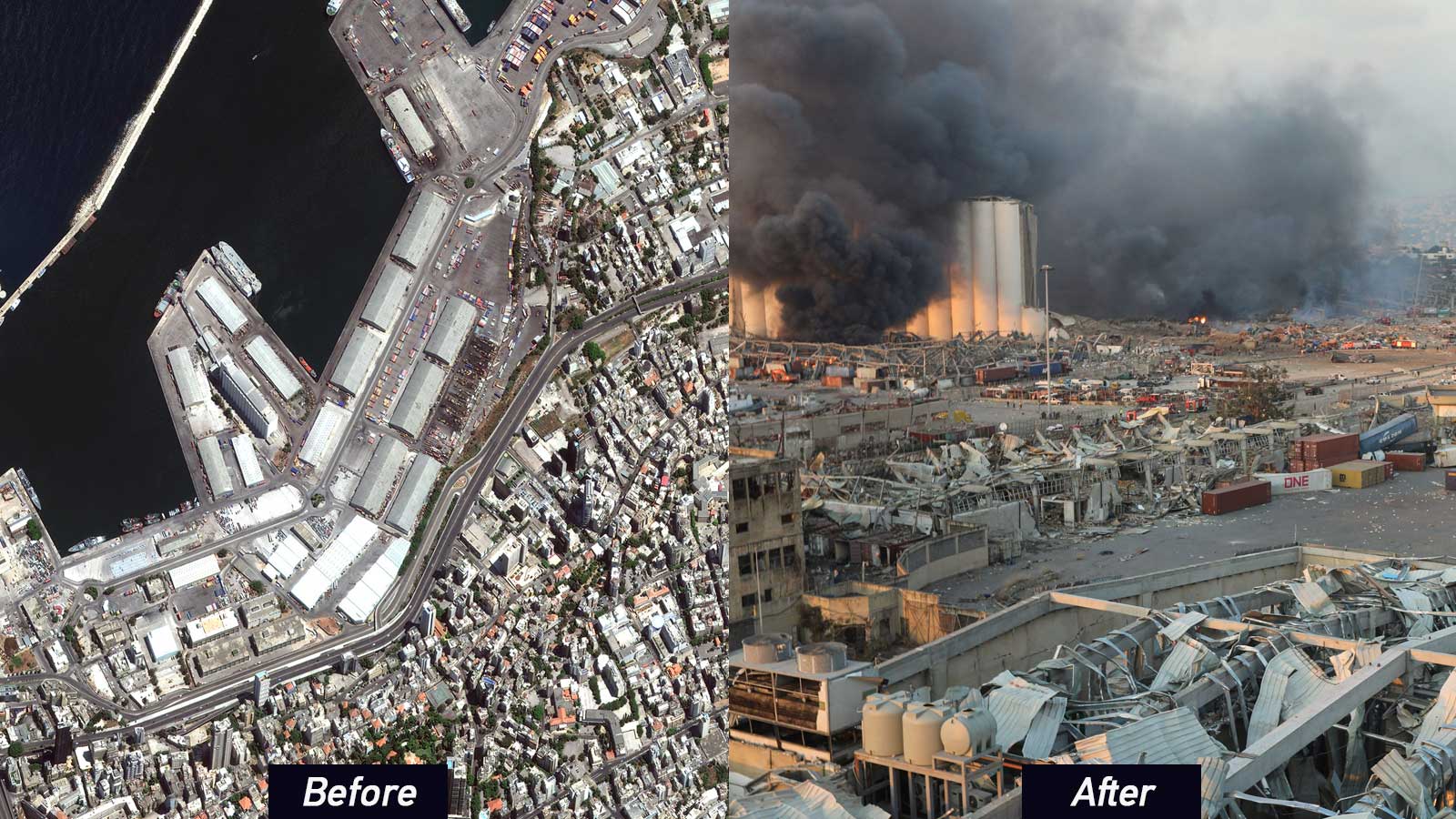
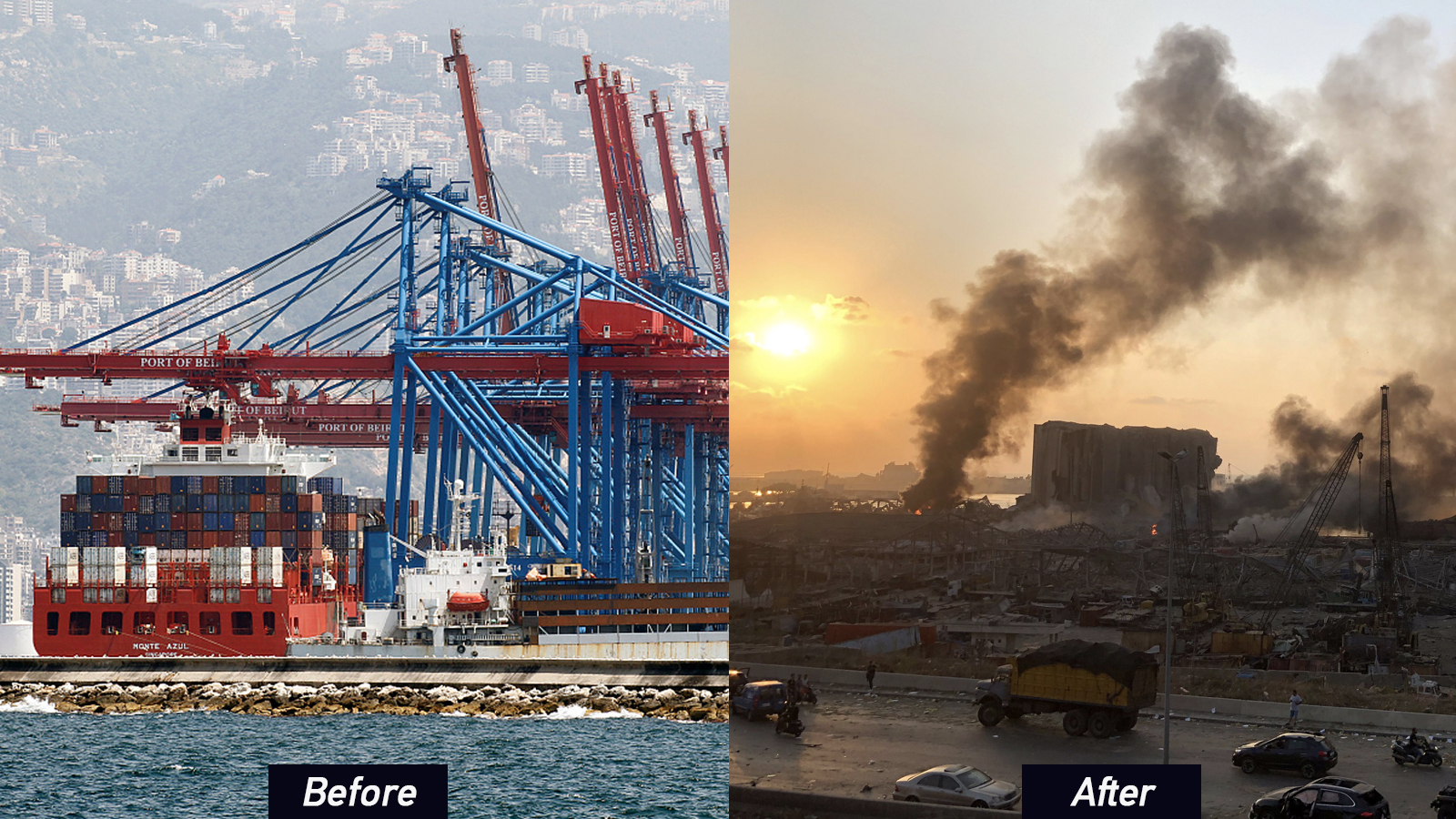
Fire from welding work set off blast in Beirut: report
Welding work being carried out on a hole in the warehouse at the Port of Beirut started the massive blast in Lebanon's capital city, Reuters reported citing a security source and local media.
Lebanon's Prime Minister Hassan Diab had said the cause of the explosion was 2,700 tonnes of ammonium nitrate stored in a warehouse for six years.
Diab told the nation that there would be accountability for the explosion at the "dangerous warehouse."
"We do not have information about what has happened precisely, what has caused this, whether it's accidental or man-made act," said United Nations spokesman Farhan Haq.
Map: Massive blast rocks Lebanon's capital Beirut
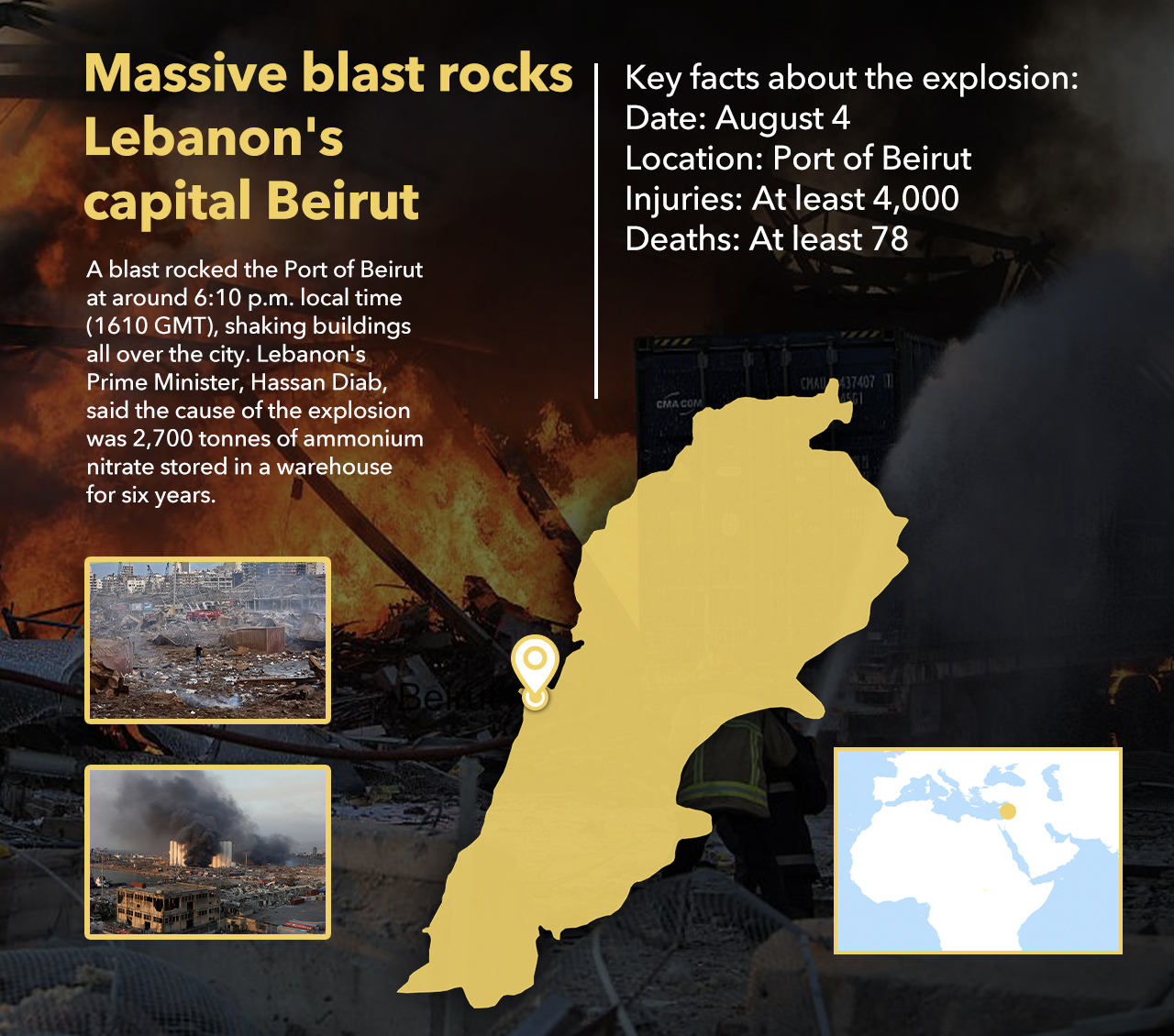
In pictures: Chaos and destruction in Beirut after blast
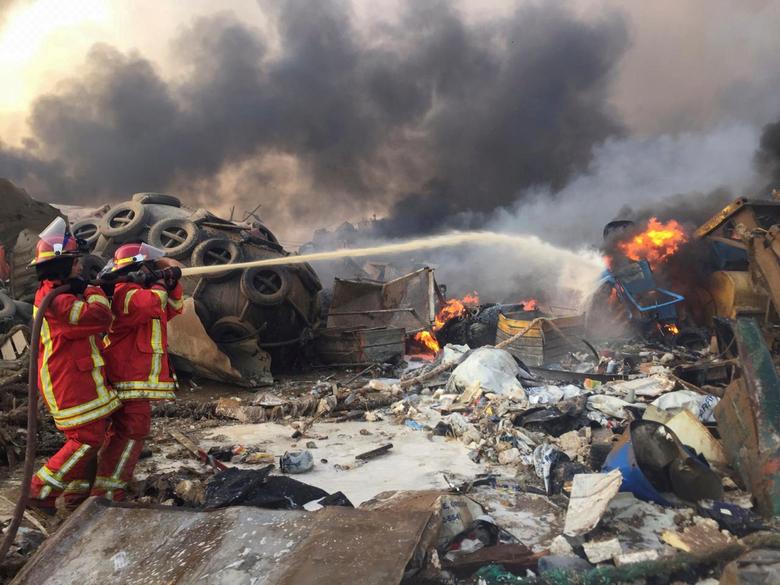
Firefighters spray water at a fire after an explosion in Beirut, Lebanon, August 4, 2020. /Reuters Photo
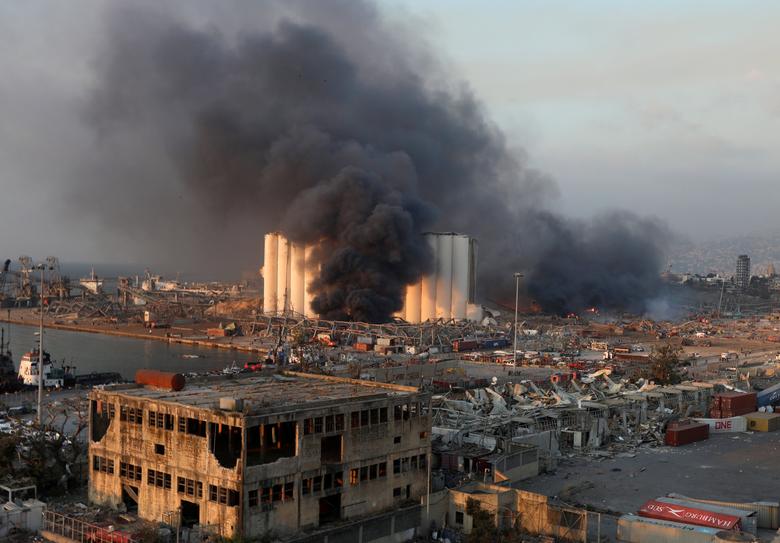
Smoke rises from the site of an explosion in Beirut's port area, Lebanon, August 4, 2020. /Reuters Photo
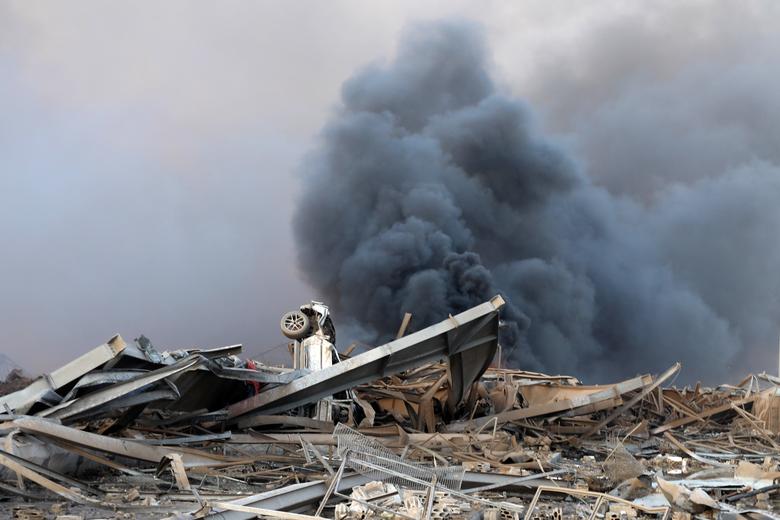
Smoke and damage are pictured at the site of an explosion in Beirut's port area, Lebanon, August 4, 2020. /Reuters Photo
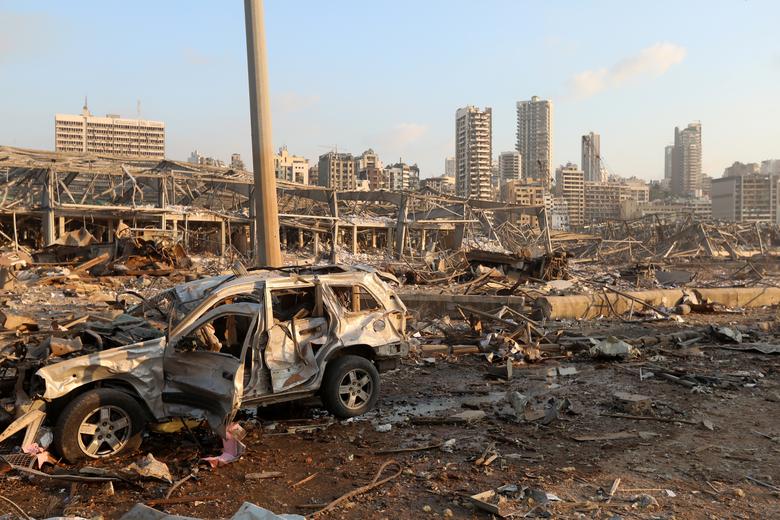
A damaged vehicle is seen at the site of an explosion in Beirut, Lebanon, August 4, 2020. /Reuters Photo
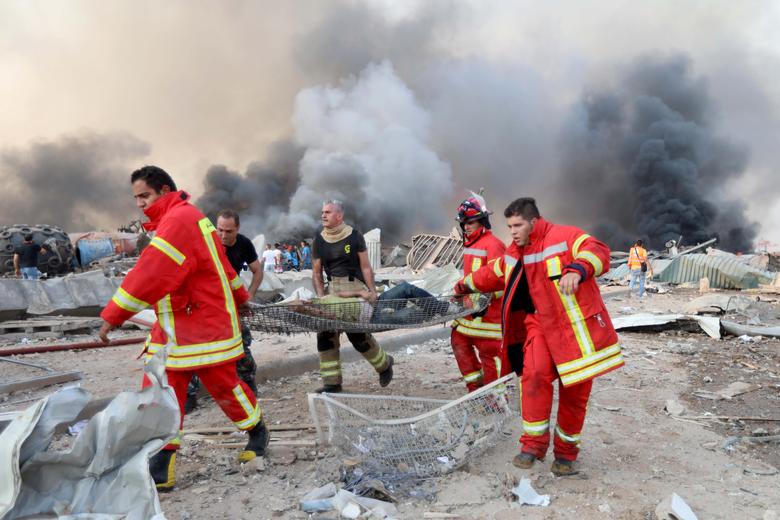
A man is evacuated at the site of an explosion in Beirut, Lebanon, August 4, 2020. /Reuters Photo
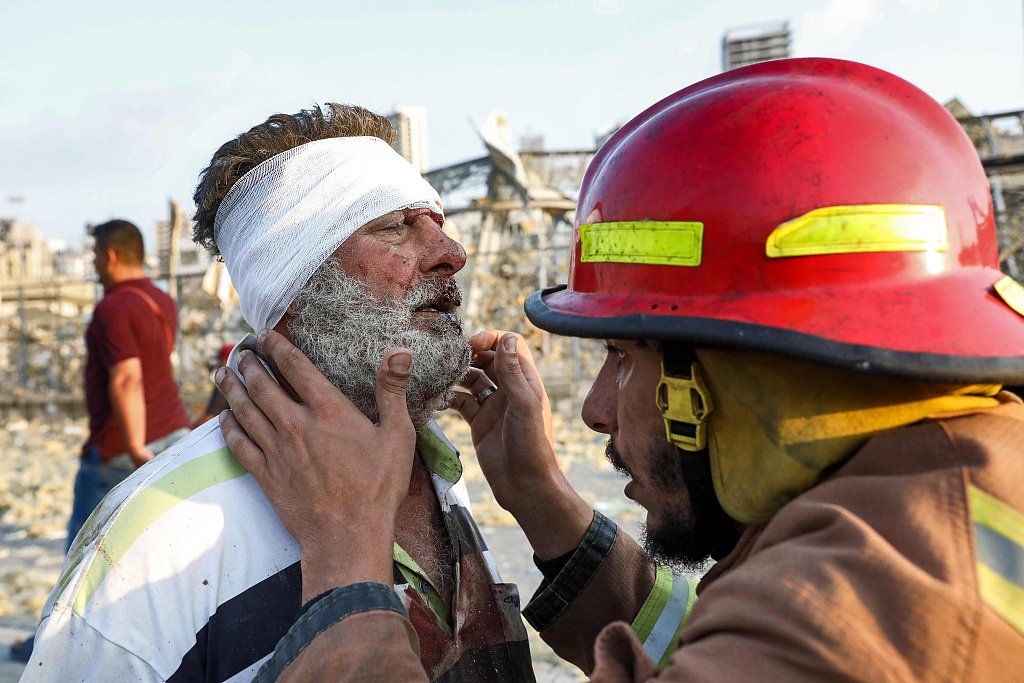
A man is rescued at the site of an explosion in Beirut, Lebanon, August 4, 2020. /CFP Photo
World offers support, condolences to Lebanon after devastating blasts
Lebanese Prime Minister Hassan Diab urged friendly countries to help Lebanon overcome the repercussions of the disastrous explosions.
UN chief Antonio Guterres expressed his deepest condolences following the "horrific explosions in Beirut" which he said had also injured some United Nations personnel.
U.S. President Donald Trump said the U.S. "stands ready to assist Lebanon" and that he had met with some U.S. generals who feel the blast was not "some kind of a manufacturing explosion type of event."
President Vladimir Putin said that“Russia shares the grief of the Lebanese people," according to a Kremlin statement.
French Foreign Minister Jean-Yves Le Drian said the country was"ready to provide assistance according to the needs expressed by the Lebanese authorities."
Canadian Prime Minister Justin Trudeau wrote on social media to say "we think of all those who were injured in this tragic explosion, as well as those who are trying to find a friend or family member or who have lost a loved one. We're ready to help you.”
In the region, Gulf nations were among the first to react, with Qatar promising to send field hospitals to support the medical response.
Qatar's ruler Emir Sheikh Tamim bin Hamad Al-Thani wished "a speedy recovery for the injured," while the United Arab Emirates' Vice President and ruler of Dubai, Sheikh Mohammed bin Rashid Al-Maktoum, tweeted "our condolences to our beloved people in Lebanon."
Kuwait said it would also send emergency medical aid. Egypt expressed "deep concern" at the destruction, and Arab League chief Ahmed Aboulgheit offered condolences, stressing "the importance of finding the truth about the explosions."
What is ammonium nitrate?
Lebanese Prime Minister Hassan Diab said that an estimated 2,750 tons of ammonium nitrate had been stored at a warehouse in Beirut for six years. Lebanese Interior Minister Mohammad Fahmi said that the explosive chemicals may have caused the explosion.
Ammonium nitrate has a number of different uses, but the two most common are as an agricultural fertilizer and as an explosive.
Ammonium nitrate does not burn. However, it will support and increase the rate of combustion in the presence of flammable or combustible materials even in the absence of oxygen.
Prime Minister Diab said in the statement it was "unacceptable" that so much explosive material was stored in a warehouse "without taking preventive measures while endangering the safety of citizens."
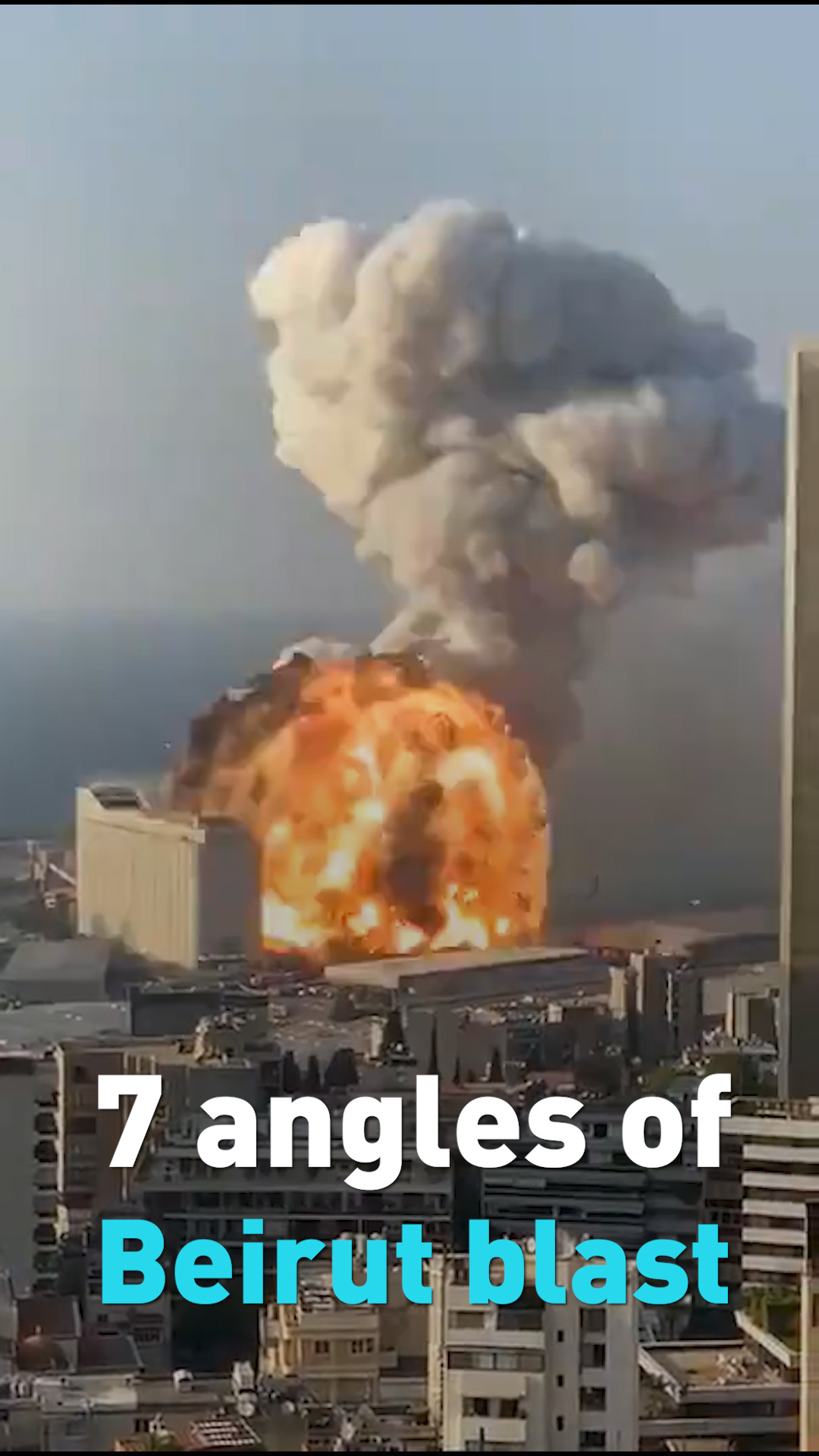
Reports of casualties are still coming in according to Lebanon’s health ministry.
Still, no one is sure what caused the massive blast that shook Beirut.
Here is the explosion from seven different angles.
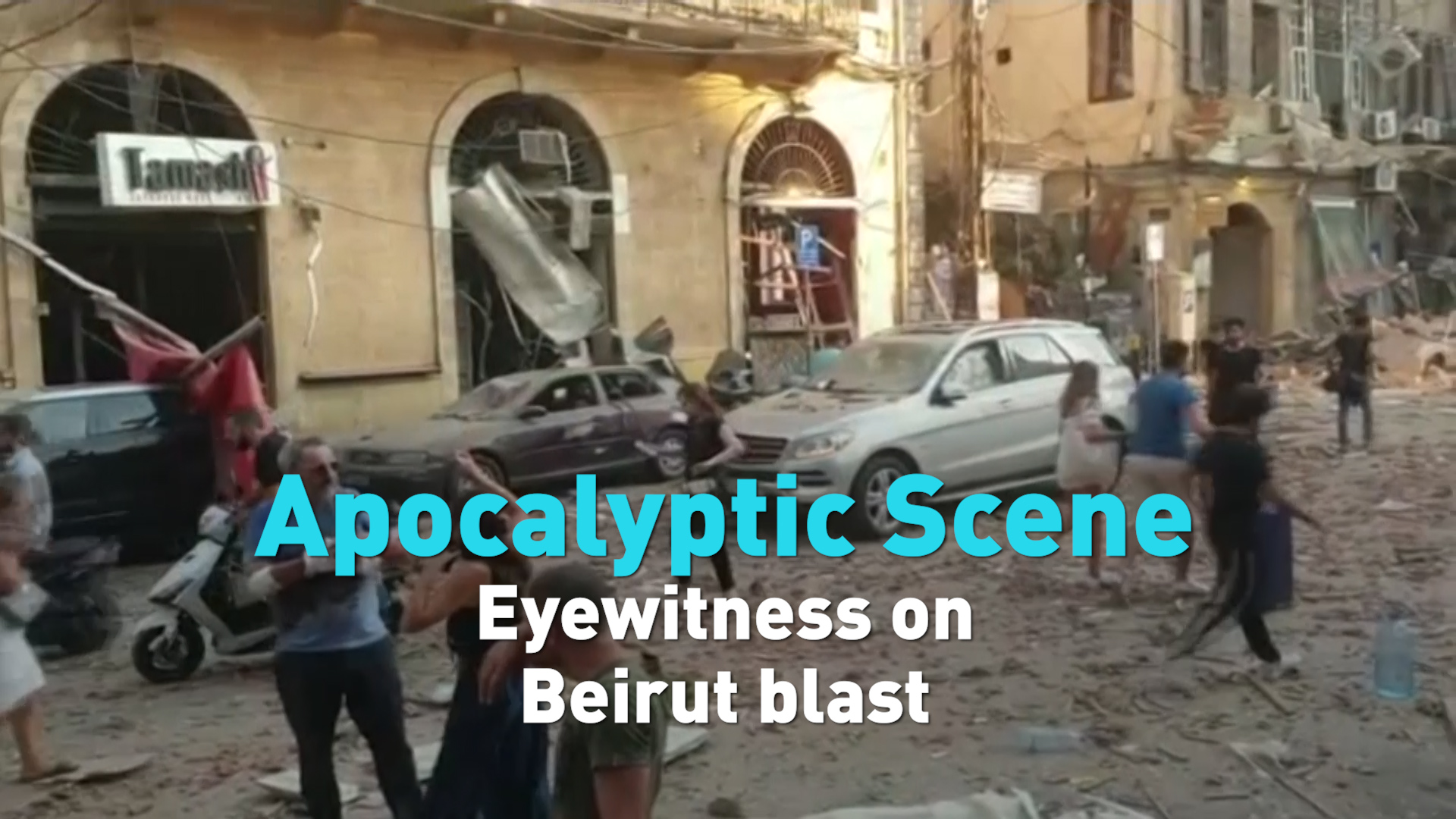
A massive blast rocked Lebanon's capital of Beirut on Tuesday, leaving scores of people dead and thousands injured.
Ralph Baydoun was in Beirut when it happened and gives his eyewitness account of the scene, describing it as apocalyptic.
Check out The China Report, our new weekly newsletter. Subscribe here!
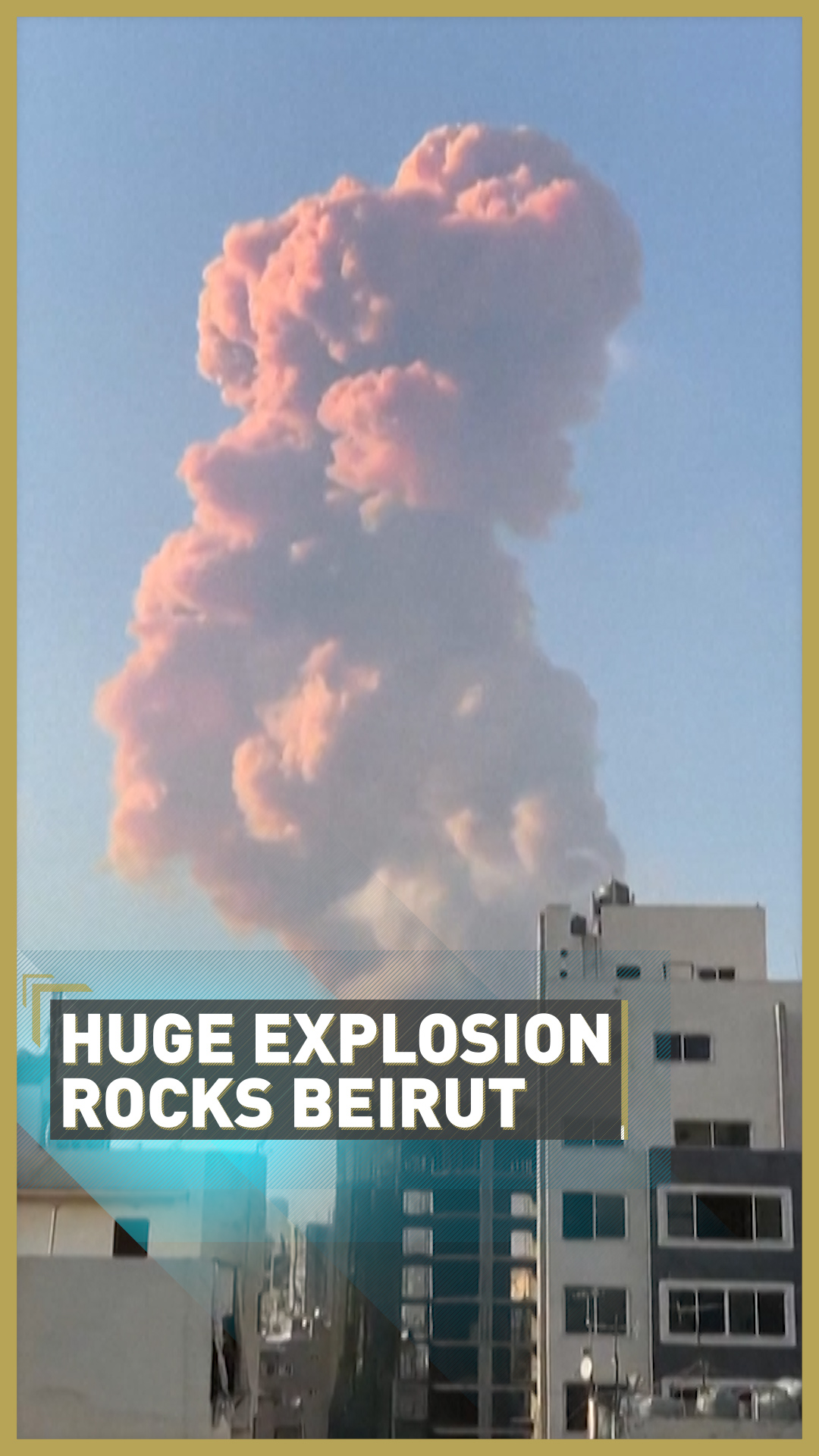
A huge explosion has rocked Lebanon's capital, Beirut, leaving at least 78 people dead and nearly 4,000 people injured, with many nearby buildings leveled to the ground.
The explosion happened in the capital city's port area, which local news agencies have confirmed is home to warehouses that contain explosives, but the source of the blast is still unknown.
Lebanon's Red Cross representative George Kettani described it as "a huge catastrophe," in an interview with broadcaster Mayadeen. "There are victims and casualties everywhere – in all the streets and areas near and far from the explosion."
Photographs and video footage from the scene show survivors covered in blood and many being carried away on stretchers while eyewitnesses described a shower of glass descending from the air in the immediate vicinity of the explosion.

A huge explosion has left dozens of people dead in Lebanon's capital, Beirut. /AFP
Footage of the blast has emerged on social media as locals filmed large plumes of smoke rising from near a multi-story building in the port before the explosion occurred.
A series of flashing lights could be seen inside the building prior to the blast, prompting onlookers to suggest it may have been a fireworks factory – though the exact cause is still unknown.
The country's health minister, Hamad Hassan, told LBCI Lebanon that "there are a high number of injuries," with buildings several kilometers away from the blast said to have been badly damaged.
In Cyprus, an island lying west of Lebanon, residents reported two large bangs in quick succession. One resident of the capital, Nicosia, said his house shook, rattling shutters.

A security source told Reuters victims were being taken for treatment outside the city because Beirut hospitals were already packed with the wounded. /AFP

Emergency services arrived at the scene to find victims covered in blood evacuating the area. /AFP

The strength of the blast turned over cars and sent a shower of glass through the air, according to witnesses. /AFP
The armed forces have been called in and local hospitals are struggling to cope with the numbers of casualties.
Lebanese President Michel Aoun called for an emergency meeting of the country's Supreme Defence Council, according to the presidency's Twitter account.
Lebanon's internal security chief, Abbas Ibrahim, touring the port area, said he would not preempt investigations. An Israeli official said Israel had nothing to do with the blast.
Meanwhile, UN spokesman Farhan Haq told reporters it was not immediately clear what the cause was and that there was no indication of any injuries to any UN personnel.
"We do not have information about what has happened precisely, what has caused this, whether it's accidental or man-made act," he said.
Source(s): AFP, Reuters

A red cloud hangs over Beirut after an explosion at the port. /Social Media
A large explosion rocked the Lebanese capital Beirut on Tuesday, damaging buildings and offices around the city.
The source of the explosion was a major fire at a warehouse for firecrackers near the port in Beirut, the state-run National News Agency reported.
A red cloud hung over the city in the wake of the blast as firefighting teams rushed to the scene to try to put out the fire.
Local news reported multiple people were wounded in the incident.
(With input from agencies)

Copyright © 2020 CGTN. Beijing ICP prepared NO.16065310-3
Copyright © 2020 CGTN. Beijing ICP prepared NO.16065310-3
Copyright © 2020 CGTN. Beijing ICP prepared NO.16065310-3